ILSI Southeast Asia Region organizes over 50 events – workshops, symposia, scientific session and more – each year. Explore recent and past events here for agendas, speaker presentations, and summaries.
2024
Science Symposium: ReThink Carbohydrates – Science, Health and Regulatory Development
24/04/2024
Kuala Lumpur, Malaysia
This 1-day IN-PERSON symposium will provide an opportunity to re-visit the role of carbohydrates in human nutrition and health, with the latest scientific and regulatory updates from experts, researchers and regional regulatory personnel. It will offer a multi-stakeholder platform to evaluate and discuss the scientific basis and approaches, to identify research gaps, recommend dietary guidance and in development of food regulations in health promotion and disease prevention efforts for the target SEA population.
WP_Query Object
(
[query] => Array
(
[post_type] => event
[posts_per_page] => 5
[type] =>
[area] =>
[before] => 2024-04-28
[after] =>
[tags] =>
[showtitle] =>
[meta_query] => Array
(
[relation] => Array
(
[0] => AND
[1] => AND
)
[0] => Array
(
[key] => _ilsi_date
[value] => 2024-04-28
[compare] => <=
)
[1] => Array
(
[key] => _ilsi_date
[value] => Array
(
[0] => 2024-01-01
[1] => 2024-04-28
)
[compare] => BETWEEN
)
[2] => Array
(
[key] => _ilsi_date
[value] => 2024-04-28
[compare] => <
)
)
[paged] => 1
[meta_key] => _ilsi_date
[orderby] => meta_value
[order] => DESC
)
[query_vars] => Array
(
[post_type] => event
[posts_per_page] => 5
[type] =>
[area] =>
[before] => 2024-04-28
[after] =>
[tags] =>
[showtitle] =>
[meta_query] => Array
(
[relation] => Array
(
[0] => AND
[1] => AND
)
[0] => Array
(
[key] => _ilsi_date
[value] => 2024-04-28
[compare] => <=
)
[1] => Array
(
[key] => _ilsi_date
[value] => Array
(
[0] => 2024-01-01
[1] => 2024-04-28
)
[compare] => BETWEEN
)
[2] => Array
(
[key] => _ilsi_date
[value] => 2024-04-28
[compare] => <
)
)
[paged] => 1
[meta_key] => _ilsi_date
[orderby] => meta_value
[order] => DESC
[error] =>
[m] =>
[p] => 0
[post_parent] =>
[subpost] =>
[subpost_id] =>
[attachment] =>
[attachment_id] => 0
[name] =>
[pagename] =>
[page_id] => 0
[second] =>
[minute] =>
[hour] =>
[day] => 0
[monthnum] => 0
[year] => 0
[w] => 0
[category_name] =>
[tag] =>
[cat] =>
[tag_id] =>
[author] =>
[author_name] =>
[feed] =>
[tb] =>
[meta_value] =>
[preview] =>
[s] =>
[sentence] =>
[title] =>
[fields] =>
[menu_order] =>
=>
[category__in] => Array
(
)
[category__not_in] => Array
(
)
[category__and] => Array
(
)
[post__in] => Array
(
)
[post__not_in] => Array
(
)
[post_name__in] => Array
(
)
[tag__in] => Array
(
)
[tag__not_in] => Array
(
)
[tag__and] => Array
(
)
[tag_slug__in] => Array
(
)
[tag_slug__and] => Array
(
)
[post_parent__in] => Array
(
)
[post_parent__not_in] => Array
(
)
[author__in] => Array
(
)
[author__not_in] => Array
(
)
[search_columns] => Array
(
)
[ignore_sticky_posts] =>
[suppress_filters] =>
[cache_results] => 1
[update_post_term_cache] => 1
[update_menu_item_cache] =>
[lazy_load_term_meta] => 1
[update_post_meta_cache] => 1
[nopaging] =>
[comments_per_page] => 50
[no_found_rows] =>
)
[tax_query] => WP_Tax_Query Object
(
[queries] => Array
(
)
[relation] => AND
[table_aliases:protected] => Array
(
)
[queried_terms] => Array
(
)
[primary_table] => wp_21_posts
[primary_id_column] => ID
)
[meta_query] => WP_Meta_Query Object
(
[queries] => Array
(
[0] => Array
(
[key] => _ilsi_date
)
[1] => Array
(
[0] => Array
(
[key] => _ilsi_date
[value] => 2024-04-28
[compare] => <=
)
[1] => Array
(
[key] => _ilsi_date
[value] => Array
(
[0] => 2024-01-01
[1] => 2024-04-28
)
[compare] => BETWEEN
)
[2] => Array
(
[key] => _ilsi_date
[value] => 2024-04-28
[compare] => <
)
[relation] => AND
)
[relation] => AND
)
[relation] => AND
[meta_table] => wp_21_postmeta
[meta_id_column] => post_id
[primary_table] => wp_21_posts
[primary_id_column] => ID
[table_aliases:protected] => Array
(
[0] => wp_21_postmeta
[1] => mt1
[2] => mt2
[3] => mt3
)
[clauses:protected] => Array
(
[wp_21_postmeta] => Array
(
[key] => _ilsi_date
[compare] => =
[compare_key] => =
[alias] => wp_21_postmeta
[cast] => CHAR
)
[mt1] => Array
(
[key] => _ilsi_date
[value] => 2024-04-28
[compare] => <=
[compare_key] => =
[alias] => mt1
[cast] => CHAR
)
[mt2] => Array
(
[key] => _ilsi_date
[value] => Array
(
[0] => 2024-01-01
[1] => 2024-04-28
)
[compare] => BETWEEN
[compare_key] => =
[alias] => mt2
[cast] => CHAR
)
[mt3] => Array
(
[key] => _ilsi_date
[value] => 2024-04-28
[compare] => <
[compare_key] => =
[alias] => mt3
[cast] => CHAR
)
)
[has_or_relation:protected] =>
)
[date_query] =>
[request] =>
SELECT SQL_CALC_FOUND_ROWS wp_21_posts.ID
FROM wp_21_posts INNER JOIN wp_21_postmeta ON ( wp_21_posts.ID = wp_21_postmeta.post_id ) INNER JOIN wp_21_postmeta AS mt1 ON ( wp_21_posts.ID = mt1.post_id ) INNER JOIN wp_21_postmeta AS mt2 ON ( wp_21_posts.ID = mt2.post_id ) INNER JOIN wp_21_postmeta AS mt3 ON ( wp_21_posts.ID = mt3.post_id )
WHERE 1=1 AND (
wp_21_postmeta.meta_key = '_ilsi_date'
AND
(
( mt1.meta_key = '_ilsi_date' AND mt1.meta_value <= '2024-04-28' )
AND
( mt2.meta_key = '_ilsi_date' AND mt2.meta_value BETWEEN '2024-01-01' AND '2024-04-28' )
AND
( mt3.meta_key = '_ilsi_date' AND mt3.meta_value < '2024-04-28' )
)
) AND ((wp_21_posts.post_type = 'event' AND (wp_21_posts.post_status = 'publish' OR wp_21_posts.post_status = 'acf-disabled')))
GROUP BY wp_21_posts.ID
ORDER BY wp_21_postmeta.meta_value DESC
LIMIT 0, 5
[posts] => Array
(
[0] => WP_Post Object
(
[ID] => 30021
[post_author] => 353
[post_date] => 2024-02-02 09:15:30
[post_date_gmt] => 2024-02-02 09:15:30
[post_content] =>
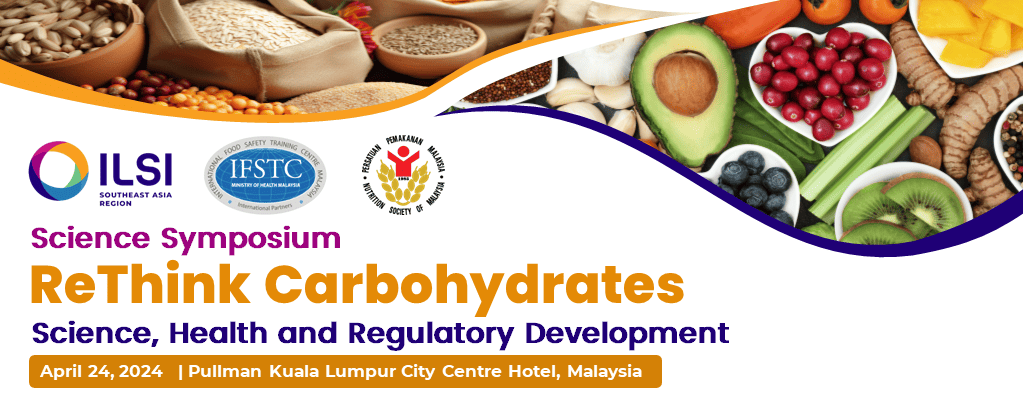
Over the past two decades, advances in scientific research have led to increasing evidence of the beneficial role of complex carbohydrates, in providing important micronutrients, dietary fiber and phytochemical, as well as some with specific components that serve certain functional benefits. In line with these increasing scientific evidence of regulatory development having taken place, especially pertaining to health claims. There is on the other hand on-going scientific debates, popular trends and social media coverage that have centered on the types and amount of carbohydrates intake in relation to health conditions such as overweight, diabetes and hyperlipidemia, with resulting confusion for consumers and misperception of dietary carbohydrates.
The 1-day IN-PERSON symposium will revisit the role of carbohydrates in human nutrition, providing scientific and regulatory updates from experts, researchers, and regional regulatory personnel. It will discuss scientific approaches, identify research gaps, and recommend dietary guidance and food regulations for health promotion and disease prevention in the SEA population.
REGISTRATION
Registration
Venue
Registration
REGISTRATION FEES

*Note: Local registration fees are only applicable to participants residing in Malaysia.

*Malaysian Registrants: This seminar, co-organized by the Nutrition Society of Malaysia (NSM), is HRD Corp-claimable.
Venue
The Science Symposium will be held IN-PERSON at:
Pullman 1 Ballroom, Level 3
Pullman Kuala Lumpur City Centre Hotel
Jalan Conlay, 50450 Kuala Lumpur, Malaysia
Please refer to the map below:
Click below to complete the online registration:
Local Registration
Overseas Registration
PROGRAM AND SPEAKERS
Opening and Welcome Remarks
Expand

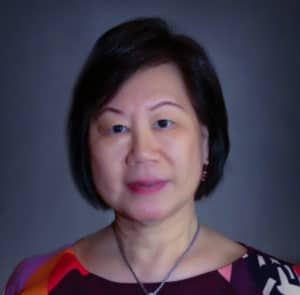
Mrs. Boon Yee Yeong is the Executive Director of ILSI SEA Region, based in Singapore. ILSI SEA Region was established as a regional branch of the world-wide scientific-foundation ILSI in 1993, covering ASEAN and Australasia. Mrs. Yeong oversees the Branch's operation, scientific programs and partnership activities, working closely with stakeholders from private sectors, leading academic institutions, international organizations and key government and health agencies throughout the vast geographical region. ILSI SEA Region facilitates programs that address pertinent nutrition, food safety and sustainability topics as well as issues for the improvement scientific decision for public health benefits.
Mrs. Yeong obtained her BSc and Masters in Nutrition and Dietetics from Kings College (previously Queen Elizabeth College) University of London, and has over the past decades actively served to build scientific capacity and nutrition improvement for the target population in the region.
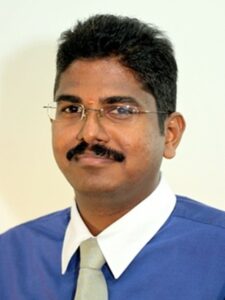 Dr. Mahenderan Appukutty is an Associate Professor of Sports Nutrition and Coordinator of the Sports and Wellness Clinic at the Faculty of Sports Science & Recreation, Universiti Teknologi MARA, Shah Alam, Malaysia. He has served as the Vice President (2020-2024) and Assistant Hon Secretary (2006-2020) of the Nutrition Society of Malaysia (NSM) before taking office as President in 2024. Dr. Appukutty also serves as Vice President of the Malaysian Association of Sports Medicine (MASM) and Council Member of the Malaysian Society of Body Composition (MSBC). He was elected to the Federation of Asian Nutrition Societies (FANS) as an Executive Council Member (2019-2023). In 2021, he was appointed Scientific Advisor of the ILSI SEA Region. He also serves on the Clinical Care Committee for the World Obesity Federation since 2013. Dr. Appukutty's research interests and focus are on functional food and exercise science. He was awarded as a Fellow of the Nutrition Society of Malaysia (FNSM) in 2016 and a Fellow of the Malaysian Association for the Study of Obesity (FMASO) in 2022. He chairs the Malaysian Vegetarian Dietary Guidelines (MoH) and contributed as a key writer for the Malaysian Dietary Guidelines. He has worked closely in the capacity building of nutritionists in the region (Southeast Asia Nutrition Leadership Program, SEAMEO-RECFON, Indonesia) and also served as Chairperson of the Malaysian Nutrition Leadership Programme (MyNLP) and South East Asia Public Health Nutrition Leadership Programme (SEAPHN LP).
Dr. Mahenderan Appukutty is an Associate Professor of Sports Nutrition and Coordinator of the Sports and Wellness Clinic at the Faculty of Sports Science & Recreation, Universiti Teknologi MARA, Shah Alam, Malaysia. He has served as the Vice President (2020-2024) and Assistant Hon Secretary (2006-2020) of the Nutrition Society of Malaysia (NSM) before taking office as President in 2024. Dr. Appukutty also serves as Vice President of the Malaysian Association of Sports Medicine (MASM) and Council Member of the Malaysian Society of Body Composition (MSBC). He was elected to the Federation of Asian Nutrition Societies (FANS) as an Executive Council Member (2019-2023). In 2021, he was appointed Scientific Advisor of the ILSI SEA Region. He also serves on the Clinical Care Committee for the World Obesity Federation since 2013. Dr. Appukutty's research interests and focus are on functional food and exercise science. He was awarded as a Fellow of the Nutrition Society of Malaysia (FNSM) in 2016 and a Fellow of the Malaysian Association for the Study of Obesity (FMASO) in 2022. He chairs the Malaysian Vegetarian Dietary Guidelines (MoH) and contributed as a key writer for the Malaysian Dietary Guidelines. He has worked closely in the capacity building of nutritionists in the region (Southeast Asia Nutrition Leadership Program, SEAMEO-RECFON, Indonesia) and also served as Chairperson of the Malaysian Nutrition Leadership Programme (MyNLP) and South East Asia Public Health Nutrition Leadership Programme (SEAPHN LP).
Dr Appukutty holds a PhD in Nutritional Sciences focusing on nutrition, immunity, and exercise performance from Universiti Kebangsaan Malaysia, an MSc in Sports Science from Universiti Sains Malaysia, and a BSc (Hons) in Nutrition and Community Health from Universiti Putra Malaysia.
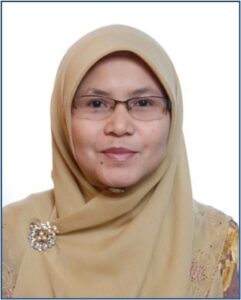 Ms. Ts. Zailina Abdul Majid, a Food Technologist since 2000 in Ministry of Health, by qualification, holds a Bachelor Degree in Industrial Technology (Food Technology), University of Science Malaysia (1995) and a Master of Science (Food Science), National University of Malaysia (2013).
Ms. Ts. Zailina Abdul Majid, a Food Technologist since 2000 in Ministry of Health, by qualification, holds a Bachelor Degree in Industrial Technology (Food Technology), University of Science Malaysia (1995) and a Master of Science (Food Science), National University of Malaysia (2013).
At present, she is the Director for the Policy, Strategic Planning and Codex Standard Division, Food Safety and Quality Programme under the Ministry of Health Malaysia. Her main responsibilities are on formulating of national policies on food safety, promulgation of national legislation, overseeing the management of food analysis, risk assessment, and communication and consumerism activities. She is also responsible in managing international issues of Codex, WTO, SPS and TBT, regional issues pertaining to ASEAN, APEC, etc, including bilateral, multilateral agreements as well as FTAs. She also attends Codex, ASEAN and other international meetings to ensure Malaysia's positions are upheld.
She is also the Secretary for the Malaysian Food Analyst Council, Assistant to the Chair for Codex Committee of Fats and Oils and at the ASEAN level, and Vice Chair for the Task Force for ASEAN Food Safety Regulatory Framework Agreement (TF AFSRF).
Session 1: Carbohydrates and Its Role in Human Nutrition and Public Health Guidance
Expand
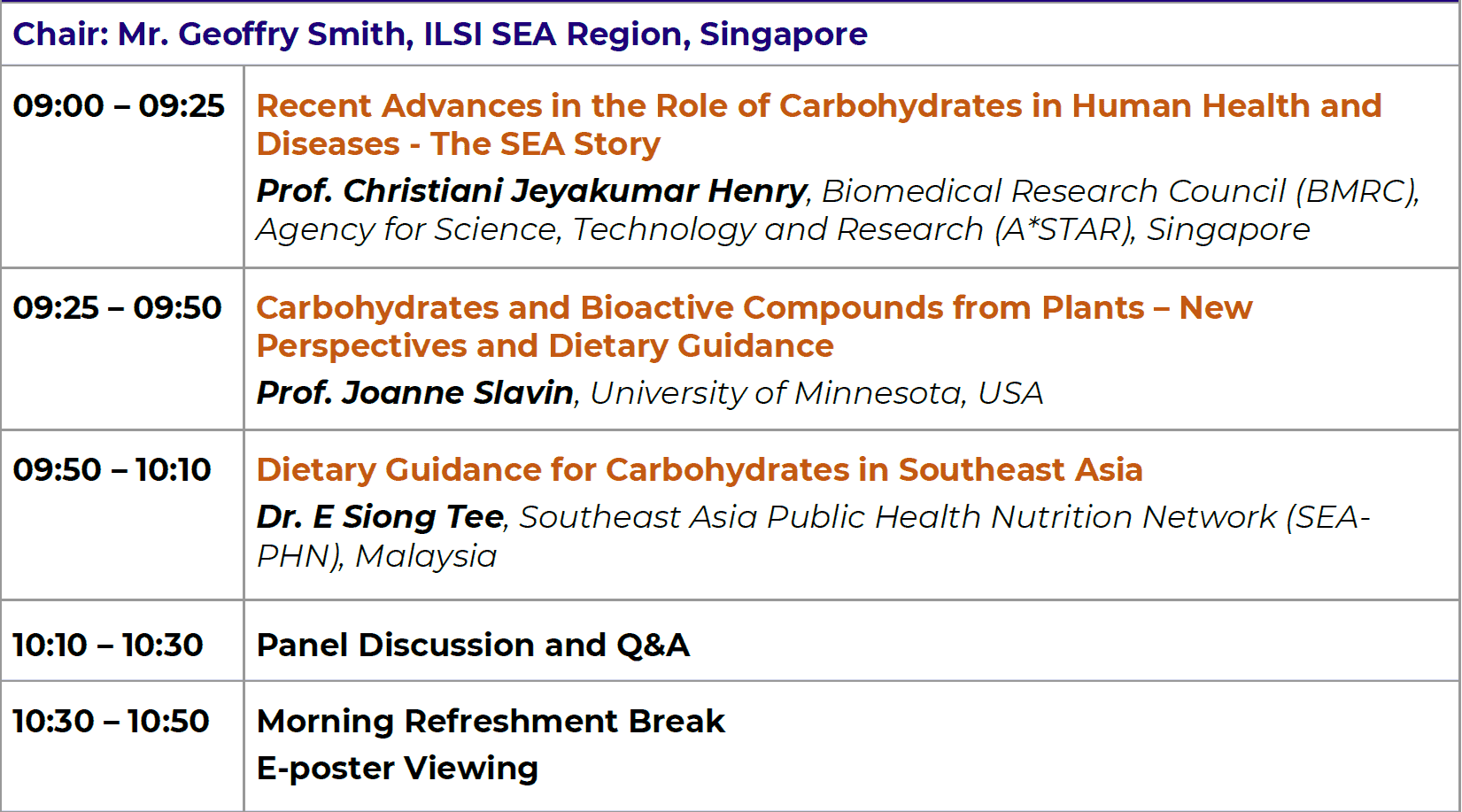
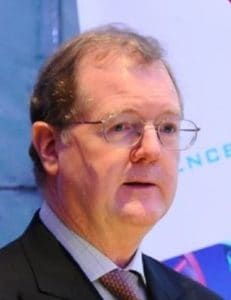 Mr. Geoffry Smith is President of ILSI Southeast Asia Region based in Singapore, and a Representative of the branch to the ILSI Global Assembly. He is also the Chairman of the Essential Micronutrients Foundation, a non-profit organization which addresses micronutrient deficiencies globally as a public health issue. In addition, he is Director of Nutrition Strategies International which deals with food and nutrition issues in developing countries. Mr. Smith serves as a member of the editorial board of the journal Food and Nutrition Bulletin. Prior to his current positions, Mr. Smith was the Global Director, Health Chelates for Akzo Nobel Functional Chemicals, and directed the global business for these compounds in food and nutrition as well as pharmaceutical applications. He was responsible for the global project within Akzo Nobel addressing iron deficiency anemia.
Mr. Geoffry Smith is President of ILSI Southeast Asia Region based in Singapore, and a Representative of the branch to the ILSI Global Assembly. He is also the Chairman of the Essential Micronutrients Foundation, a non-profit organization which addresses micronutrient deficiencies globally as a public health issue. In addition, he is Director of Nutrition Strategies International which deals with food and nutrition issues in developing countries. Mr. Smith serves as a member of the editorial board of the journal Food and Nutrition Bulletin. Prior to his current positions, Mr. Smith was the Global Director, Health Chelates for Akzo Nobel Functional Chemicals, and directed the global business for these compounds in food and nutrition as well as pharmaceutical applications. He was responsible for the global project within Akzo Nobel addressing iron deficiency anemia.
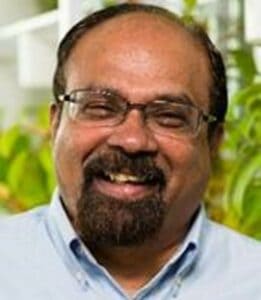 Prof. Christiani Jeyakumar Henry is currently Senior Advisor, BMRC, A*STAR, Singapore. Until recently, he was Deputy Executive Director of the Singapore Institute of Food and Biotechnology Innovation (SIFBI) and the Director of the Clinical Nutrition Research Centre, A*STAR. He trained initially as a food scientist. He obtained his MSc and PhD in Nutrition from the London School of Hygiene and Tropical Medicine. He was a Board member of UK Food Standards Agency. Prof. Henry is on the Board of Directors of International Life Sciences Institute South East Asia Region (ILSI SEA Region), and Advisory board of Monell Chemical Senses Centre, USA. In 2010, he was awarded the British Nutrition Foundation prize for his outstanding contribution to nutrition. He was made a Fellow of the International Academy of Food Scientists and Technologists (2012). Prof. Henry was recipient of the NutraIngredients-Asia NutraChampion Awards 2019, Institute of Food Technologists (IFT) - W.K. Kellogg International Food Security Award & Lectureship 2019, 100 Most Influential Asian Scientist - 2019 Edition, Asian Scientist Magazine, and the prestigious Niigata International Food Award 2018 known as "Asian World Food Prize". He was the scientific commentator on the highly successful TV program "Food Detective. He continues to be actively engaged in improving the food and nutritional status of people in the ASEAN region and beyond.
Prof. Christiani Jeyakumar Henry is currently Senior Advisor, BMRC, A*STAR, Singapore. Until recently, he was Deputy Executive Director of the Singapore Institute of Food and Biotechnology Innovation (SIFBI) and the Director of the Clinical Nutrition Research Centre, A*STAR. He trained initially as a food scientist. He obtained his MSc and PhD in Nutrition from the London School of Hygiene and Tropical Medicine. He was a Board member of UK Food Standards Agency. Prof. Henry is on the Board of Directors of International Life Sciences Institute South East Asia Region (ILSI SEA Region), and Advisory board of Monell Chemical Senses Centre, USA. In 2010, he was awarded the British Nutrition Foundation prize for his outstanding contribution to nutrition. He was made a Fellow of the International Academy of Food Scientists and Technologists (2012). Prof. Henry was recipient of the NutraIngredients-Asia NutraChampion Awards 2019, Institute of Food Technologists (IFT) - W.K. Kellogg International Food Security Award & Lectureship 2019, 100 Most Influential Asian Scientist - 2019 Edition, Asian Scientist Magazine, and the prestigious Niigata International Food Award 2018 known as "Asian World Food Prize". He was the scientific commentator on the highly successful TV program "Food Detective. He continues to be actively engaged in improving the food and nutritional status of people in the ASEAN region and beyond.
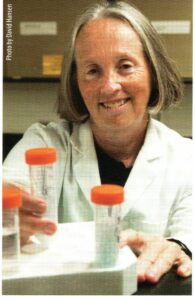 Prof. Joanne Slavin is a professor in the Department of Food Science and Nutrition at the University of Minnesota - Twin Cities, College of Food, Agricultural and Natural Resource Sciences, teaching Advanced Human Nutrition. She holds BS, MS, and PhD degrees from the University of Wisconsin-Madison and a Registered Dietitian (RDN). Notably, Prof. Slavin was a member of the 2010 Dietary Guidelines Advisory Committee (DGAC), contributing significantly to the national nutrition guidelines.
Prof. Joanne Slavin is a professor in the Department of Food Science and Nutrition at the University of Minnesota - Twin Cities, College of Food, Agricultural and Natural Resource Sciences, teaching Advanced Human Nutrition. She holds BS, MS, and PhD degrees from the University of Wisconsin-Madison and a Registered Dietitian (RDN). Notably, Prof. Slavin was a member of the 2010 Dietary Guidelines Advisory Committee (DGAC), contributing significantly to the national nutrition guidelines.
Prof. Slavin's extensive research contributions include over 350 scientific articles covering diverse topics such as dietary fiber, carbohydrates, whole grains, protein, snacking, gut health, brain health, and sustainable agriculture. In addition, she had delivered over 400 scientific presentations globally. Prof. Slavin also actively engages in science communication initiatives as a Science Communicator for the Institute of Food Technologists (IFT), while also holding membership in esteemed scientific societies such as the Academy of Nutrition and Dietetics (AND) and the American Society for Nutrition (ASN).
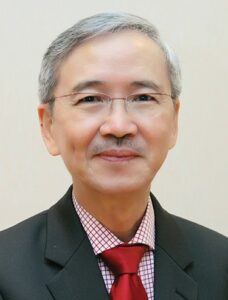 Dr. E Siong Tee is Nutrition Consultant for TES NutriHealth Strategic Consultanc, Malaysia. He is also Adjunct Professor for International Medical University and a Member of the Board of Directors of ILSI SEA Region and Scientific Coordinator of ILSI Malaysia Country Committee. Dr. Tee was Head of the Cardiovascular, Diabetes and Nutrition Research Centre of the Institute for Medical Research (IMR) in Kuala Lumpur, Malaysia, until his retirement in February 2002, after serving for 30 years. He is a member of several Technical Working Groups of the Ministry of Health Malaysia, including the committees related to Malaysian Food Regulations and Codex Alimentarius. He initiated the formation of the Southeast Asia Public Health Nutrition (SEA-PHN) Network in 2014 and is the current Chairman of the Network.
Dr. E Siong Tee is Nutrition Consultant for TES NutriHealth Strategic Consultanc, Malaysia. He is also Adjunct Professor for International Medical University and a Member of the Board of Directors of ILSI SEA Region and Scientific Coordinator of ILSI Malaysia Country Committee. Dr. Tee was Head of the Cardiovascular, Diabetes and Nutrition Research Centre of the Institute for Medical Research (IMR) in Kuala Lumpur, Malaysia, until his retirement in February 2002, after serving for 30 years. He is a member of several Technical Working Groups of the Ministry of Health Malaysia, including the committees related to Malaysian Food Regulations and Codex Alimentarius. He initiated the formation of the Southeast Asia Public Health Nutrition (SEA-PHN) Network in 2014 and is the current Chairman of the Network.
Session 2: Science of Carbohydrate Quality and Its Impact on Health
Expand
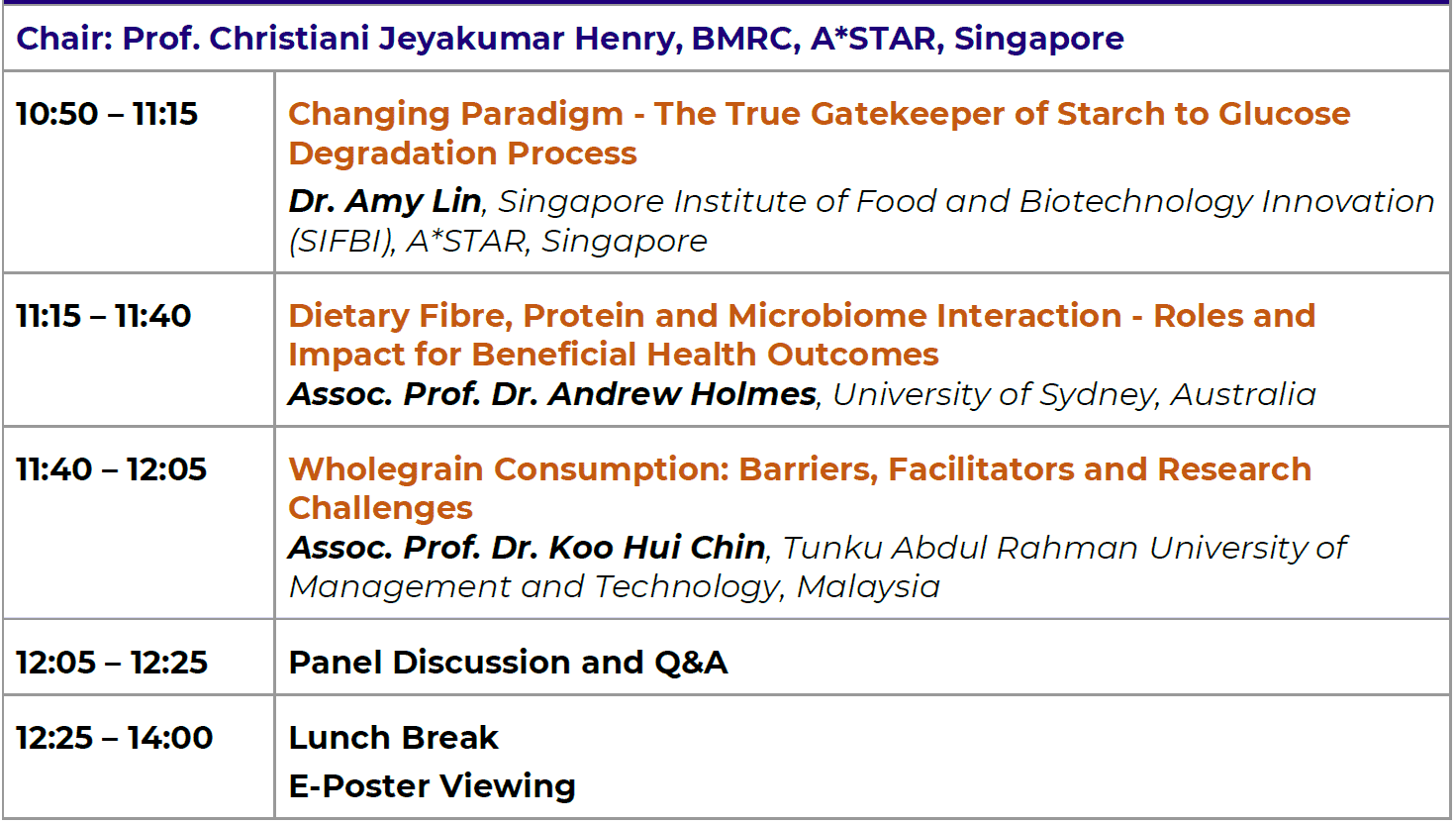
 Prof. Christiani Jeyakumar Henry is currently Senior Advisor, BMRC, A*STAR, Singapore. Until recently, he was Deputy Executive Director of the Singapore Institute of Food and Biotechnology Innovation (SIFBI) and the Director of the Clinical Nutrition Research Centre, A*STAR. He trained initially as a food scientist. He obtained his MSc and PhD in Nutrition from the London School of Hygiene and Tropical Medicine. He was a Board member of UK Food Standards Agency. Prof. Henry is on the Board of Directors of International Life Sciences Institute South East Asia Region (ILSI SEA Region), and Advisory board of Monell Chemical Senses Centre, USA. In 2010, he was awarded the British Nutrition Foundation prize for his outstanding contribution to nutrition. He was made a Fellow of the International Academy of Food Scientists and Technologists (2012). Prof. Henry was recipient of the NutraIngredients-Asia NutraChampion Awards 2019, Institute of Food Technologists (IFT) - W.K. Kellogg International Food Security Award & Lectureship 2019, 100 Most Influential Asian Scientist - 2019 Edition, Asian Scientist Magazine, and the prestigious Niigata International Food Award 2018 known as "Asian World Food Prize". He was the scientific commentator on the highly successful TV program "Food Detective. He continues to be actively engaged in improving the food and nutritional status of people in the ASEAN region and beyond.
Prof. Christiani Jeyakumar Henry is currently Senior Advisor, BMRC, A*STAR, Singapore. Until recently, he was Deputy Executive Director of the Singapore Institute of Food and Biotechnology Innovation (SIFBI) and the Director of the Clinical Nutrition Research Centre, A*STAR. He trained initially as a food scientist. He obtained his MSc and PhD in Nutrition from the London School of Hygiene and Tropical Medicine. He was a Board member of UK Food Standards Agency. Prof. Henry is on the Board of Directors of International Life Sciences Institute South East Asia Region (ILSI SEA Region), and Advisory board of Monell Chemical Senses Centre, USA. In 2010, he was awarded the British Nutrition Foundation prize for his outstanding contribution to nutrition. He was made a Fellow of the International Academy of Food Scientists and Technologists (2012). Prof. Henry was recipient of the NutraIngredients-Asia NutraChampion Awards 2019, Institute of Food Technologists (IFT) - W.K. Kellogg International Food Security Award & Lectureship 2019, 100 Most Influential Asian Scientist - 2019 Edition, Asian Scientist Magazine, and the prestigious Niigata International Food Award 2018 known as "Asian World Food Prize". He was the scientific commentator on the highly successful TV program "Food Detective. He continues to be actively engaged in improving the food and nutritional status of people in the ASEAN region and beyond.
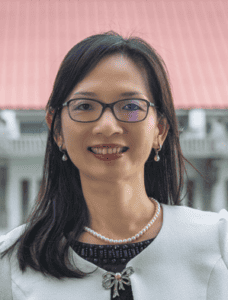 Dr. Amy Lin is a Senior Principal Scientist leading the Food Carbohydrate Platform at the Singapore Institute of Food and Biotechnology Innovation at A*STAR, a Singapore government research entity. Her general research area is carbohydrates and health and structure-function relationships of carbohydrates. Amy's particular interest is slowing the starch degradation process into glucose and controlling carbohydrate utilisation between digestion and colonic fermentation. She is an expert in starch degradation enzymes and starch molecular & granular structure, and she is experienced in potato and wheat quality. Dr. Lin is a former faculty member at Purdue University (USA), the University of Idaho (USA), and Washington State University (USA) and a visiting associate professor at the National Taiwan University (Taiwan). She formerly served as the Chair of the Carbohydrate Division at IFT and AACCI (renamed "Cereals & Grains Association); a Scientific Committee member for the past conferences of Food Hydrocolloids and IUFoST. Dr. Lin is also an Associate Editor of Cereal Chemistry and Bioactive Carbohydrates and Dietary Fibre and has a leading role in Starch Digestion Consortium Inc. (non-profit).
Dr. Amy Lin is a Senior Principal Scientist leading the Food Carbohydrate Platform at the Singapore Institute of Food and Biotechnology Innovation at A*STAR, a Singapore government research entity. Her general research area is carbohydrates and health and structure-function relationships of carbohydrates. Amy's particular interest is slowing the starch degradation process into glucose and controlling carbohydrate utilisation between digestion and colonic fermentation. She is an expert in starch degradation enzymes and starch molecular & granular structure, and she is experienced in potato and wheat quality. Dr. Lin is a former faculty member at Purdue University (USA), the University of Idaho (USA), and Washington State University (USA) and a visiting associate professor at the National Taiwan University (Taiwan). She formerly served as the Chair of the Carbohydrate Division at IFT and AACCI (renamed "Cereals & Grains Association); a Scientific Committee member for the past conferences of Food Hydrocolloids and IUFoST. Dr. Lin is also an Associate Editor of Cereal Chemistry and Bioactive Carbohydrates and Dietary Fibre and has a leading role in Starch Digestion Consortium Inc. (non-profit).
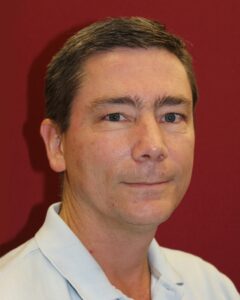 Assoc. Prof. Dr. Andrew Holmes has general interests in microbial diversity, its evolutionary origins and ecological applications. He did his PhD studies at the University of Queensland before postdoctoral stints at the University of Warwick, UK and Macquarie University. In 2002 he joined the University of Sydney where he is now Associate Professor in the School of Molecular Bioscience and Microbiome Project node leader in the Charles Perkins Centre. He has particular interests in the relationship between food and health. His research focusses on how diet manipulation via food components influences the host-microbiome interaction and potential for informing public health guidelines or diet interventions in chronic disease. He is currently a Fellow of Food Standards Australia New Zealand.
Assoc. Prof. Dr. Andrew Holmes has general interests in microbial diversity, its evolutionary origins and ecological applications. He did his PhD studies at the University of Queensland before postdoctoral stints at the University of Warwick, UK and Macquarie University. In 2002 he joined the University of Sydney where he is now Associate Professor in the School of Molecular Bioscience and Microbiome Project node leader in the Charles Perkins Centre. He has particular interests in the relationship between food and health. His research focusses on how diet manipulation via food components influences the host-microbiome interaction and potential for informing public health guidelines or diet interventions in chronic disease. He is currently a Fellow of Food Standards Australia New Zealand.
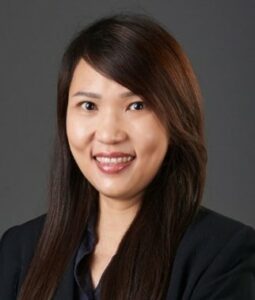 Dr. Koo Hui Chin is an associate professor at Tunku Abdul Rahman University of Management and Technology. She received her Ph.D. (Nutrition) from the Universiti Kebangsaan Malaysia in 2017. She started her first career as a clinical dietician in the Ministry of Health from 2007 until 2013, prior to pursuing her PhD. She is one of the writers for the revision of "Strategy for the Prevention of Obesity-Malaysia", (SPOM), a national level guideline. Several awards have been received by her, such as the Outstanding Researcher Award from Tunku Abdul Rahman University of Management and Technology and the Publication Prize Award from the Nutrition Society of Malaysia. She has authored and co-authored a number of research papers related to whole grain, diabetes, childhood obesity and chrono-nutrition. Several research grants have been awarded by the Ministry of Higher Education and other institutions to conduct studies, particularly in whole grain, diabetes and chrono-nutrition. Dr. Koo was featured in leading local newspapers, sharing her knowledge of nutritional health too. She is quite skilled at altering healthy dishes and has a passion for nutrition.
Dr. Koo Hui Chin is an associate professor at Tunku Abdul Rahman University of Management and Technology. She received her Ph.D. (Nutrition) from the Universiti Kebangsaan Malaysia in 2017. She started her first career as a clinical dietician in the Ministry of Health from 2007 until 2013, prior to pursuing her PhD. She is one of the writers for the revision of "Strategy for the Prevention of Obesity-Malaysia", (SPOM), a national level guideline. Several awards have been received by her, such as the Outstanding Researcher Award from Tunku Abdul Rahman University of Management and Technology and the Publication Prize Award from the Nutrition Society of Malaysia. She has authored and co-authored a number of research papers related to whole grain, diabetes, childhood obesity and chrono-nutrition. Several research grants have been awarded by the Ministry of Higher Education and other institutions to conduct studies, particularly in whole grain, diabetes and chrono-nutrition. Dr. Koo was featured in leading local newspapers, sharing her knowledge of nutritional health too. She is quite skilled at altering healthy dishes and has a passion for nutrition.
Session 3: Science and Innovation Updates in Carbohydrates
Expand
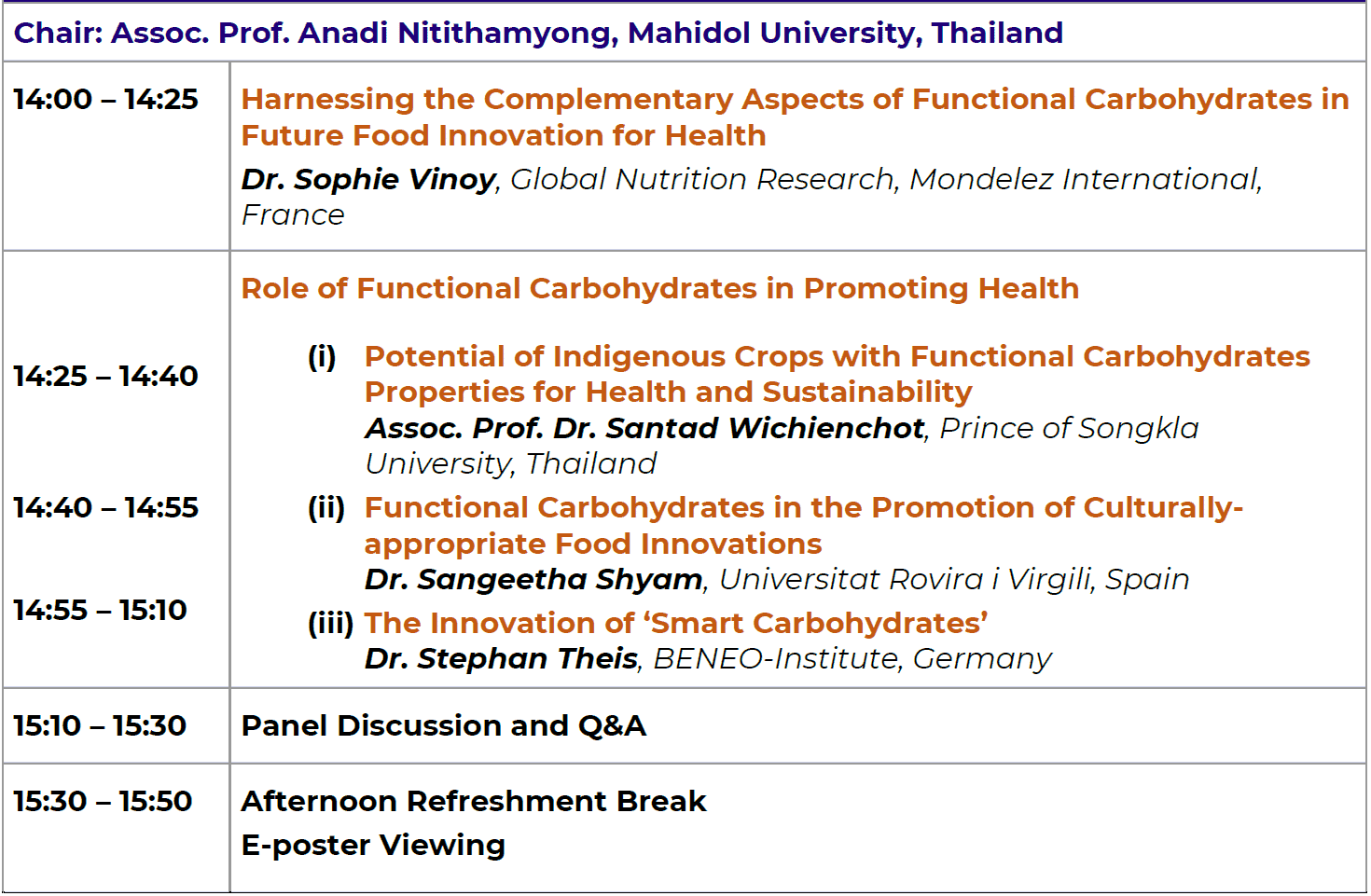
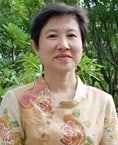 Asst. Prof. Anadi Nitithamyong spent her academic career at the Institute of Nutrition, Mahidol University (INMU), Thailand where she served as the Deputy Director for Education and Special Affairs from 2008 to 2011 and Deputy Director for Policy and Planning from 2015 to 2016. Her research interest and experience involve food processing and product development for nutritional and functional purposes, particularly in dietary fibre related areas. Currently, she is the Immediate Past President of the Food Science and Technology Association of Thailand (FoSTAT), and a member of the Nutrition Association of Thailand (NAT). She is also a member of the Panel of Science Advisors of ILSI SEA Region and is the Coordinator of its Thailand Country Committee. Dr. Nitithamyong received her PhD in Food Science from the University of Wisconsin-Madison, USA.
Asst. Prof. Anadi Nitithamyong spent her academic career at the Institute of Nutrition, Mahidol University (INMU), Thailand where she served as the Deputy Director for Education and Special Affairs from 2008 to 2011 and Deputy Director for Policy and Planning from 2015 to 2016. Her research interest and experience involve food processing and product development for nutritional and functional purposes, particularly in dietary fibre related areas. Currently, she is the Immediate Past President of the Food Science and Technology Association of Thailand (FoSTAT), and a member of the Nutrition Association of Thailand (NAT). She is also a member of the Panel of Science Advisors of ILSI SEA Region and is the Coordinator of its Thailand Country Committee. Dr. Nitithamyong received her PhD in Food Science from the University of Wisconsin-Madison, USA.
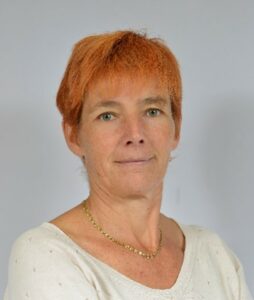 Dr. Sophie Vinoy obtained her PhD from the French Paris University of life science in human physiology. She is the nutrition senior group leader in global research department of Mondelēz International. She is strongly involved in the European International Life Science Institute at the cross section of academic and industrial scientific partnership. Her primary interest is the impact of food on postprandial metabolism linked to metabolic disease prevention involving food behaviour, low grade inflammation and microbiota modulation. Her main publications are on carbohydrate metabolism and investigated specifically health interest of starch digestibility, as well as satiety. She is co-author of several patents related to foods and health interest.
Dr. Sophie Vinoy obtained her PhD from the French Paris University of life science in human physiology. She is the nutrition senior group leader in global research department of Mondelēz International. She is strongly involved in the European International Life Science Institute at the cross section of academic and industrial scientific partnership. Her primary interest is the impact of food on postprandial metabolism linked to metabolic disease prevention involving food behaviour, low grade inflammation and microbiota modulation. Her main publications are on carbohydrate metabolism and investigated specifically health interest of starch digestibility, as well as satiety. She is co-author of several patents related to foods and health interest.
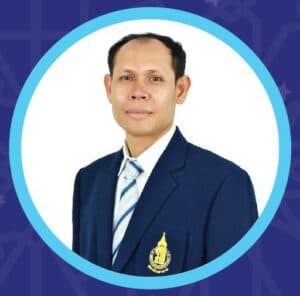 Dr. Santad Wichienchot is an Associate Professor, Director of Center of Excellence in Functional Foods and Gastronomy, and Vice Dean for Research Innovation and International Affairs, Faculty of Agro-Industry, Prince of Songkla University (PSU), Thailand. His research focuses on functional carbohydrates, prebiotics, functional food/ingredient for gut-brain health. He is research program administrator, principal investigator and co-investigator of 38 completed research projects in last 16 years. He holds 12 patents and research collaboration with 12 companies. He has published 48 articles in the last 5 years in peer-reviewed and internationally referred Food Science & Technology and Life Science Journals. He had been published 5 book chapters, 1) "Prebiotic oligosaccharides: origins and production, health benefits and commercial applications" in 2011; 2) "Prebiotics and dietary fibers from food processing by-products"; 3) "Sustainability of nutraceuticals and functional foods" had been published in John Wiley & Sons, Inc. in 2017.; 4) "Polyphenols from food processing by-products and their microbiota-gut-brain axis based health benefits", had been published in 2021 by Elsevier. 5) "Dietary fibers: Structural aspects and nutritional implications. In Food Hydrocolloids Functionalities and Applications" had been published in 2021, Springer Nature Inc. He is invited speaker and participate in international conferences. He is currently serving as reviewer in several International Journals in Food and Health Sciences. Dr.Santad Wichienchot received his PhD in Biotechnology with Food Science and Technology background. He had experience in research work on prebiotics and gut microbiota at University of Reading, UK during he was studying in PhD. and during postdoctoral study. He got a Best PSU Advisor in Science and Technology Award in 2020 and a Best PSU Researcher in Science and Technology and Health Science Award in 2022.
Dr. Santad Wichienchot is an Associate Professor, Director of Center of Excellence in Functional Foods and Gastronomy, and Vice Dean for Research Innovation and International Affairs, Faculty of Agro-Industry, Prince of Songkla University (PSU), Thailand. His research focuses on functional carbohydrates, prebiotics, functional food/ingredient for gut-brain health. He is research program administrator, principal investigator and co-investigator of 38 completed research projects in last 16 years. He holds 12 patents and research collaboration with 12 companies. He has published 48 articles in the last 5 years in peer-reviewed and internationally referred Food Science & Technology and Life Science Journals. He had been published 5 book chapters, 1) "Prebiotic oligosaccharides: origins and production, health benefits and commercial applications" in 2011; 2) "Prebiotics and dietary fibers from food processing by-products"; 3) "Sustainability of nutraceuticals and functional foods" had been published in John Wiley & Sons, Inc. in 2017.; 4) "Polyphenols from food processing by-products and their microbiota-gut-brain axis based health benefits", had been published in 2021 by Elsevier. 5) "Dietary fibers: Structural aspects and nutritional implications. In Food Hydrocolloids Functionalities and Applications" had been published in 2021, Springer Nature Inc. He is invited speaker and participate in international conferences. He is currently serving as reviewer in several International Journals in Food and Health Sciences. Dr.Santad Wichienchot received his PhD in Biotechnology with Food Science and Technology background. He had experience in research work on prebiotics and gut microbiota at University of Reading, UK during he was studying in PhD. and during postdoctoral study. He got a Best PSU Advisor in Science and Technology Award in 2020 and a Best PSU Researcher in Science and Technology and Health Science Award in 2022.
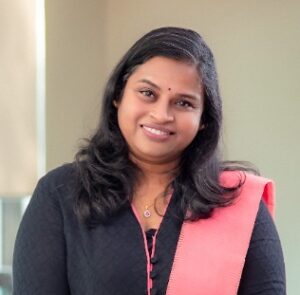 Dr. Sangeetha Shyam is currently a Maria Zambrano Fellow at the Rovira i Virgili University, IISPV & CIBEROBN, Spain. She is a Working Group Member of the Federation of European Nutrition Societies, that develops guidelines to improve reporting standards in nutrition trials internationally. Dr. Shyam is an esteemed alumna of the Interstellar Initiative by the New York Academy of Sciences and the Japanese Agency for Medical Research & Development, which recognizes promising early-career researchers. Prior to her fellowship, she served as a Senior Lecturer at the International Medical University, Malaysia, from 2013 until 2022. Her scholarly achievements include 40 peer-reviewed publications, 3 invited editorials, 4 book chapters, and 1 international technical report.
Dr. Sangeetha Shyam is currently a Maria Zambrano Fellow at the Rovira i Virgili University, IISPV & CIBEROBN, Spain. She is a Working Group Member of the Federation of European Nutrition Societies, that develops guidelines to improve reporting standards in nutrition trials internationally. Dr. Shyam is an esteemed alumna of the Interstellar Initiative by the New York Academy of Sciences and the Japanese Agency for Medical Research & Development, which recognizes promising early-career researchers. Prior to her fellowship, she served as a Senior Lecturer at the International Medical University, Malaysia, from 2013 until 2022. Her scholarly achievements include 40 peer-reviewed publications, 3 invited editorials, 4 book chapters, and 1 international technical report.
Some of Dr. Shyam's research work includes a year-long dietary trial targeting metabolic risks in Malaysian women with prior Gestational Diabetes Mellitus (GDM), which includes programming a Malaysian Diet Database Calculator and a project exploring the association between nutrition transitions and obesity using nationwide datasets. Her international postdoctoral research work in the UK, Spain and Singapore focused on obesity, dietary patterns, pancreatic cancer and glycemic index values of non-Western foods.
Dr. Shyam actively participates in research dissemination and capacity building. She is an Associate Editor for the Malaysian Journal of Nutrition and has organized conferences, chaired sessions, presented internationally, and delivered public talks for the Ministry of Health, Malaysia & Nutrition Society of Malaysia. She was recently elected as a Fellow of the Nutrition Society of Malaysia for recognition of her contributions towards nutrition in the country.
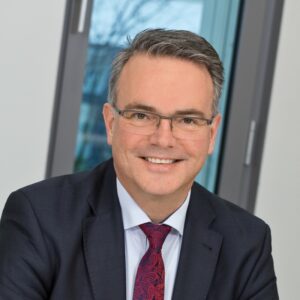 Dr. Stephan Theis is Head of Nutrition Science and Communication at BENEO-Institute. His responsibilities include the scientific research activities on the nutritional and health benefits of Beneo's functional carbohydrate ingredients worldwide. Stephan joined the Suedzucker/Beneo Group in 2001. He graduated with a diploma in Nutrition Science from the University of Giessen, Germany and obtained a PhD (Dr. rer. nat) from the Technical University of Munich. He is actively involved in international scientific committees and collaborative research projects including several Committees of the International Life Science Institute (ILSI).
Dr. Stephan Theis is Head of Nutrition Science and Communication at BENEO-Institute. His responsibilities include the scientific research activities on the nutritional and health benefits of Beneo's functional carbohydrate ingredients worldwide. Stephan joined the Suedzucker/Beneo Group in 2001. He graduated with a diploma in Nutrition Science from the University of Giessen, Germany and obtained a PhD (Dr. rer. nat) from the Technical University of Munich. He is actively involved in international scientific committees and collaborative research projects including several Committees of the International Life Science Institute (ILSI).
Session 4: Regulatory Updates of Carbohydrates and Promotion Programme in Southeast Asia
Expand
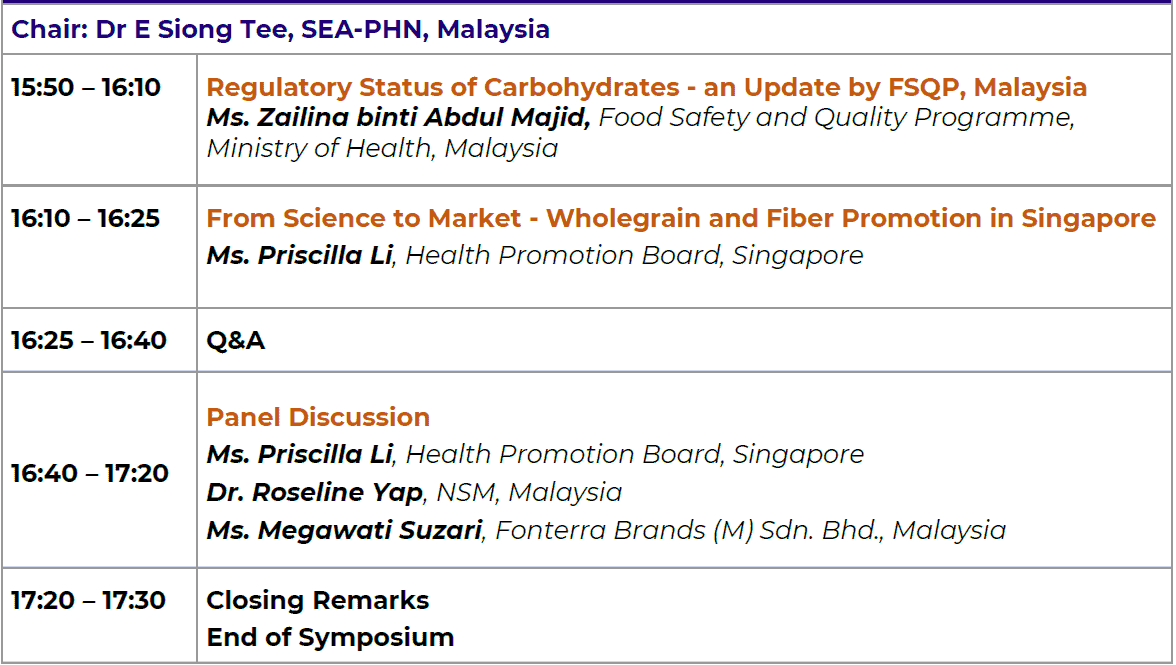
 Dr. E Siong Tee is Nutrition Consultant for TES NutriHealth Strategic Consultanc, Malaysia. He is also Adjunct Professor for International Medical University and a Member of the Board of Directors of ILSI SEA Region and Scientific Coordinator of ILSI Malaysia Country Committee. Dr. Tee was Head of the Cardiovascular, Diabetes and Nutrition Research Centre of the Institute for Medical Research (IMR) in Kuala Lumpur, Malaysia, until his retirement in February 2002, after serving for 30 years. He is a member of several Technical Working Groups of the Ministry of Health Malaysia, including the committees related to Malaysian Food Regulations and Codex Alimentarius. He initiated the formation of the Southeast Asia Public Health Nutrition (SEA-PHN) Network in 2014 and is the current Chairman of the Network.
Dr. E Siong Tee is Nutrition Consultant for TES NutriHealth Strategic Consultanc, Malaysia. He is also Adjunct Professor for International Medical University and a Member of the Board of Directors of ILSI SEA Region and Scientific Coordinator of ILSI Malaysia Country Committee. Dr. Tee was Head of the Cardiovascular, Diabetes and Nutrition Research Centre of the Institute for Medical Research (IMR) in Kuala Lumpur, Malaysia, until his retirement in February 2002, after serving for 30 years. He is a member of several Technical Working Groups of the Ministry of Health Malaysia, including the committees related to Malaysian Food Regulations and Codex Alimentarius. He initiated the formation of the Southeast Asia Public Health Nutrition (SEA-PHN) Network in 2014 and is the current Chairman of the Network.
 Ms. Ts. Zailina Abdul Majid, a Food Technologist since 2000 in Ministry of Health, by qualification, holds a Bachelor Degree in Industrial Technology (Food Technology), University of Science Malaysia (1995) and a Master of Science (Food Science), National University of Malaysia (2013).
Ms. Ts. Zailina Abdul Majid, a Food Technologist since 2000 in Ministry of Health, by qualification, holds a Bachelor Degree in Industrial Technology (Food Technology), University of Science Malaysia (1995) and a Master of Science (Food Science), National University of Malaysia (2013).
At present, she is the Director for the Policy, Strategic Planning and Codex Standard Division, Food Safety and Quality Programme under the Ministry of Health Malaysia. Her main responsibilities are on formulating of national policies on food safety, promulgation of national legislation, overseeing the management of food analysis, risk assessment, and communication and consumerism activities. She is also responsible in managing international issues of Codex, WTO, SPS and TBT, regional issues pertaining to ASEAN, APEC, etc, including bilateral, multilateral agreements as well as FTAs. She also attends Codex, ASEAN and other international meetings to ensure Malaysia's positions are upheld.
She is also the Secretary for the Malaysian Food Analyst Council, Assistant to the Chair for Codex Committee of Fats and Oils and at the ASEAN level, and Vice Chair for the Task Force for ASEAN Food Safety Regulatory Framework Agreement (TF AFSRF).
 Ms. Priscilla Li works within the Policy and Strategy Development team in HPB. She leads pieces relating to Nutri-Grade and sugar reduction, maternal and child health, as well as food labelling and claims.
Ms. Priscilla Li works within the Policy and Strategy Development team in HPB. She leads pieces relating to Nutri-Grade and sugar reduction, maternal and child health, as well as food labelling and claims.
She is an accredited practicing dietitian and a certified nutrition support specialist. She received the Ministry of Health - Healthcare Manpower Development Award and obtained fellowship at Cambridge University Hospital and St Georges' Hospital in the UK.
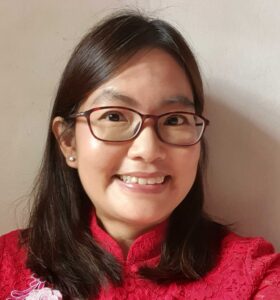 Dr. Roseline Yap started her career as an academic and scientist in the field of nutrition. Currently, she is the Managing Editor for Malaysian Journal of Nutrition. Roseline has been a Council Member of the Nutrition Society of Malaysia (NSM) since 2012 and currently is the Honorary Treasurer. Her passion is in the field of community nutrition therefore she is in the expert committee for several programmes such as Nutrition Month Malaysia, Positive Parenting including leading the nutrition promotion programme, NSM Roadshows 2.0.
Dr. Roseline Yap started her career as an academic and scientist in the field of nutrition. Currently, she is the Managing Editor for Malaysian Journal of Nutrition. Roseline has been a Council Member of the Nutrition Society of Malaysia (NSM) since 2012 and currently is the Honorary Treasurer. Her passion is in the field of community nutrition therefore she is in the expert committee for several programmes such as Nutrition Month Malaysia, Positive Parenting including leading the nutrition promotion programme, NSM Roadshows 2.0.
Ms. Megawati Suzar, Fonterra Brands (M) Sdn. Bhd., Malaysia
Note: Topic and Title of presentations are subject to change upon final confirmation with invited speakers.
Download Program
VIRTUAL POSTERS
Virtual posters were submitted by academicians and researchers, students, healthcare professionals, government, policy and regulatory authority, and industry innovators, in line with the symposium's session themes.
Browse through and download their abstracts and e-posters below!
View Posters and Abstracts
ORGANIZER
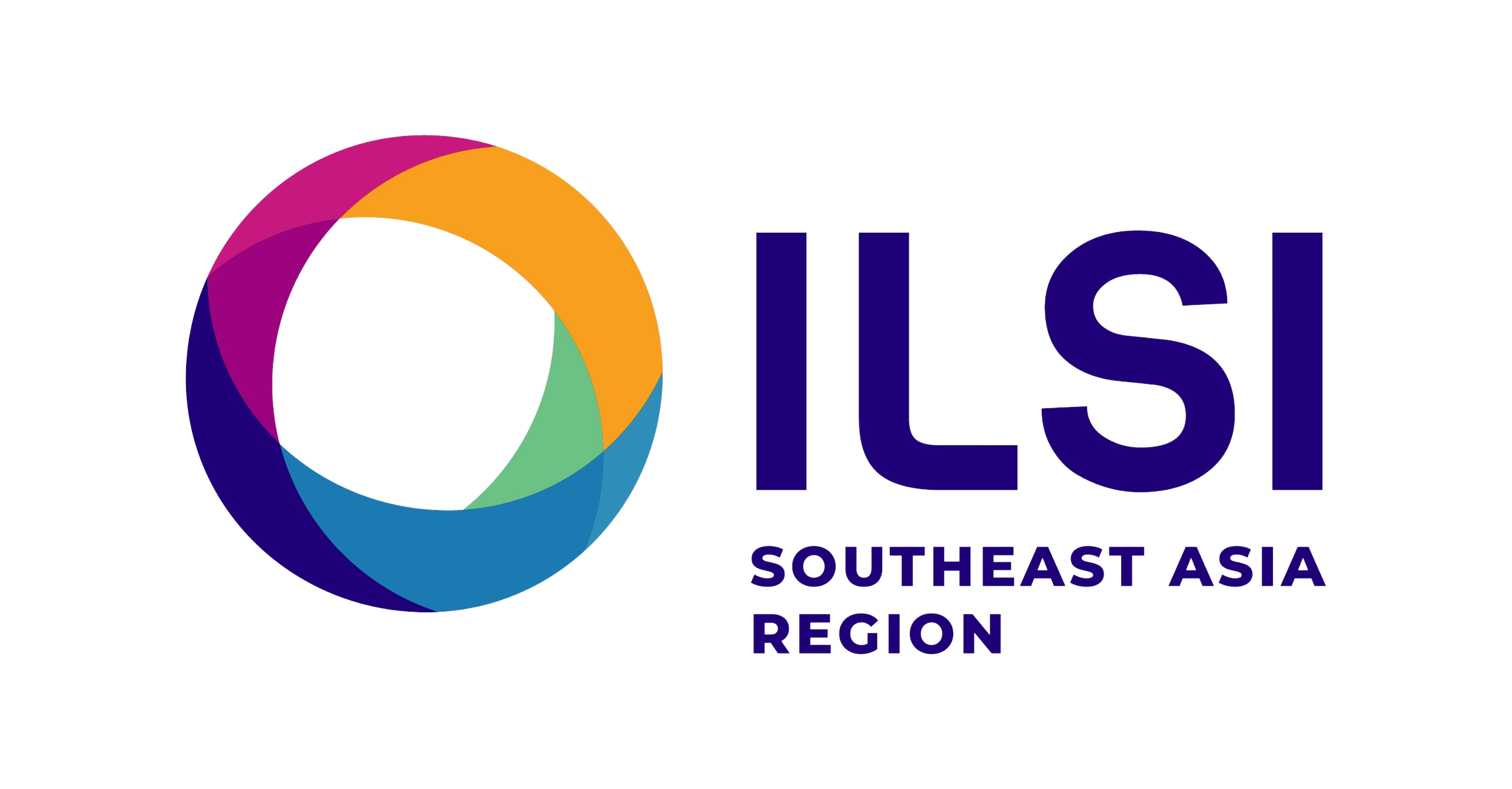
CO-ORGANIZERS
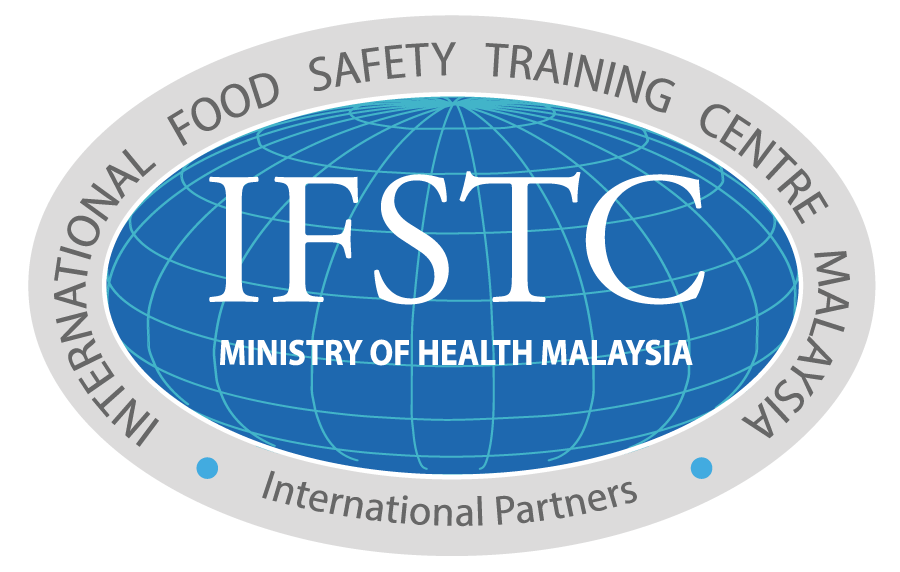
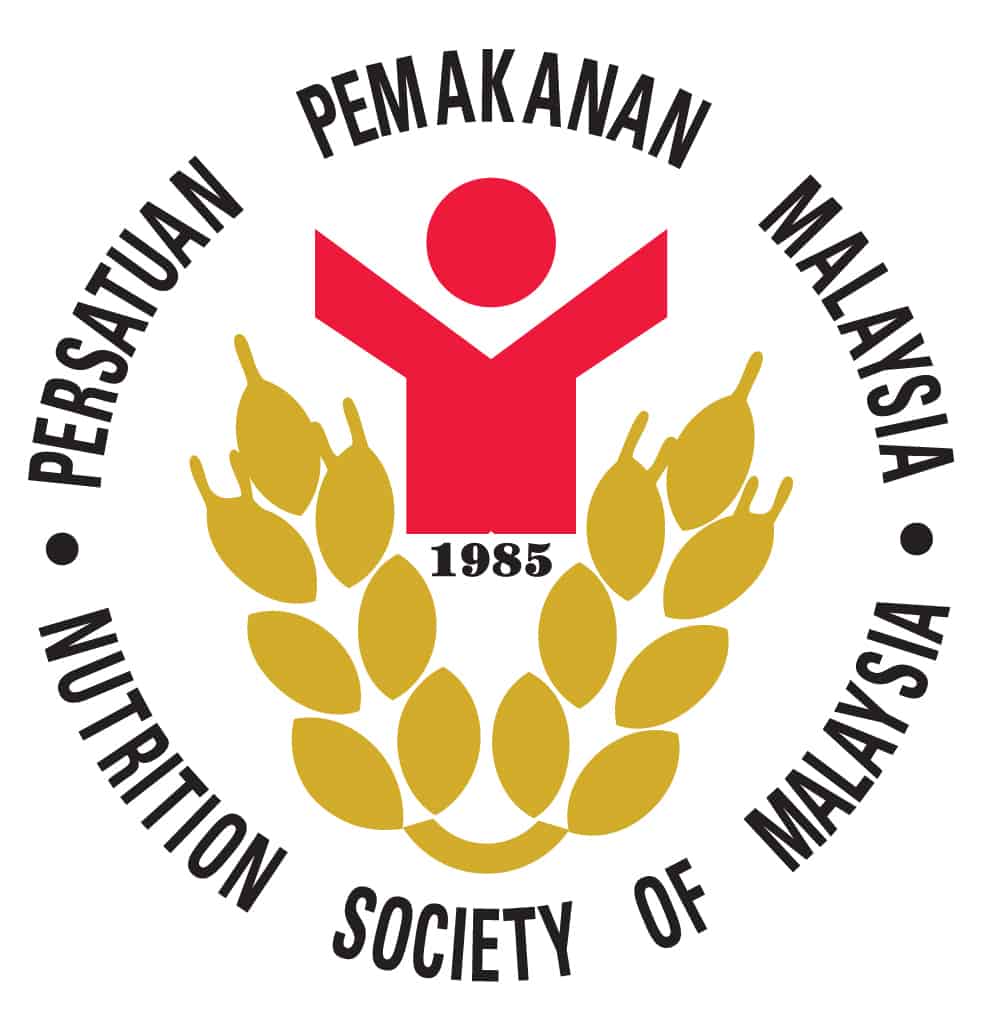
CONTACT
If you have any inquiries, please do not hesitate to contact the following:
For Local Participants:
Dr. Tee E Siong
Malaysia
Email: estee@nutrihealth.com.my
For Overseas Participants:
ILSI Southeast Asia Region
Singapore
Tel: 65 6352 5220
Email: event@ilsisea.org.sg
[post_title] => Science Symposium: ReThink Carbohydrates - Science, Health and Regulatory Development
[post_excerpt] =>
[post_status] => publish
[comment_status] => closed
[ping_status] => closed
[post_password] =>
[post_name] => agm-2024-science-symposium
[to_ping] =>
[pinged] =>
[post_modified] => 2024-04-23 15:40:54
[post_modified_gmt] => 2024-04-23 15:40:54
[post_content_filtered] =>
[post_parent] => 0
[guid] => https://ilsisea-region.org/?post_type=event&p=30021
[menu_order] => 0
[post_type] => event
[post_mime_type] =>
[comment_count] => 0
[filter] => raw
)
)
[post_count] => 1
[current_post] => -1
[before_loop] =>
[in_the_loop] =>
[post] => WP_Post Object
(
[ID] => 30021
[post_author] => 353
[post_date] => 2024-02-02 09:15:30
[post_date_gmt] => 2024-02-02 09:15:30
[post_content] =>

Over the past two decades, advances in scientific research have led to increasing evidence of the beneficial role of complex carbohydrates, in providing important micronutrients, dietary fiber and phytochemical, as well as some with specific components that serve certain functional benefits. In line with these increasing scientific evidence of regulatory development having taken place, especially pertaining to health claims. There is on the other hand on-going scientific debates, popular trends and social media coverage that have centered on the types and amount of carbohydrates intake in relation to health conditions such as overweight, diabetes and hyperlipidemia, with resulting confusion for consumers and misperception of dietary carbohydrates.
The 1-day IN-PERSON symposium will revisit the role of carbohydrates in human nutrition, providing scientific and regulatory updates from experts, researchers, and regional regulatory personnel. It will discuss scientific approaches, identify research gaps, and recommend dietary guidance and food regulations for health promotion and disease prevention in the SEA population.
REGISTRATION
Registration
Venue
Registration
REGISTRATION FEES

*Note: Local registration fees are only applicable to participants residing in Malaysia.

*Malaysian Registrants: This seminar, co-organized by the Nutrition Society of Malaysia (NSM), is HRD Corp-claimable.
Venue
The Science Symposium will be held IN-PERSON at:
Pullman 1 Ballroom, Level 3
Pullman Kuala Lumpur City Centre Hotel
Jalan Conlay, 50450 Kuala Lumpur, Malaysia
Please refer to the map below:
Click below to complete the online registration:
Local Registration
Overseas Registration
PROGRAM AND SPEAKERS
Opening and Welcome Remarks
Expand


Mrs. Boon Yee Yeong is the Executive Director of ILSI SEA Region, based in Singapore. ILSI SEA Region was established as a regional branch of the world-wide scientific-foundation ILSI in 1993, covering ASEAN and Australasia. Mrs. Yeong oversees the Branch's operation, scientific programs and partnership activities, working closely with stakeholders from private sectors, leading academic institutions, international organizations and key government and health agencies throughout the vast geographical region. ILSI SEA Region facilitates programs that address pertinent nutrition, food safety and sustainability topics as well as issues for the improvement scientific decision for public health benefits.
Mrs. Yeong obtained her BSc and Masters in Nutrition and Dietetics from Kings College (previously Queen Elizabeth College) University of London, and has over the past decades actively served to build scientific capacity and nutrition improvement for the target population in the region.
 Dr. Mahenderan Appukutty is an Associate Professor of Sports Nutrition and Coordinator of the Sports and Wellness Clinic at the Faculty of Sports Science & Recreation, Universiti Teknologi MARA, Shah Alam, Malaysia. He has served as the Vice President (2020-2024) and Assistant Hon Secretary (2006-2020) of the Nutrition Society of Malaysia (NSM) before taking office as President in 2024. Dr. Appukutty also serves as Vice President of the Malaysian Association of Sports Medicine (MASM) and Council Member of the Malaysian Society of Body Composition (MSBC). He was elected to the Federation of Asian Nutrition Societies (FANS) as an Executive Council Member (2019-2023). In 2021, he was appointed Scientific Advisor of the ILSI SEA Region. He also serves on the Clinical Care Committee for the World Obesity Federation since 2013. Dr. Appukutty's research interests and focus are on functional food and exercise science. He was awarded as a Fellow of the Nutrition Society of Malaysia (FNSM) in 2016 and a Fellow of the Malaysian Association for the Study of Obesity (FMASO) in 2022. He chairs the Malaysian Vegetarian Dietary Guidelines (MoH) and contributed as a key writer for the Malaysian Dietary Guidelines. He has worked closely in the capacity building of nutritionists in the region (Southeast Asia Nutrition Leadership Program, SEAMEO-RECFON, Indonesia) and also served as Chairperson of the Malaysian Nutrition Leadership Programme (MyNLP) and South East Asia Public Health Nutrition Leadership Programme (SEAPHN LP).
Dr. Mahenderan Appukutty is an Associate Professor of Sports Nutrition and Coordinator of the Sports and Wellness Clinic at the Faculty of Sports Science & Recreation, Universiti Teknologi MARA, Shah Alam, Malaysia. He has served as the Vice President (2020-2024) and Assistant Hon Secretary (2006-2020) of the Nutrition Society of Malaysia (NSM) before taking office as President in 2024. Dr. Appukutty also serves as Vice President of the Malaysian Association of Sports Medicine (MASM) and Council Member of the Malaysian Society of Body Composition (MSBC). He was elected to the Federation of Asian Nutrition Societies (FANS) as an Executive Council Member (2019-2023). In 2021, he was appointed Scientific Advisor of the ILSI SEA Region. He also serves on the Clinical Care Committee for the World Obesity Federation since 2013. Dr. Appukutty's research interests and focus are on functional food and exercise science. He was awarded as a Fellow of the Nutrition Society of Malaysia (FNSM) in 2016 and a Fellow of the Malaysian Association for the Study of Obesity (FMASO) in 2022. He chairs the Malaysian Vegetarian Dietary Guidelines (MoH) and contributed as a key writer for the Malaysian Dietary Guidelines. He has worked closely in the capacity building of nutritionists in the region (Southeast Asia Nutrition Leadership Program, SEAMEO-RECFON, Indonesia) and also served as Chairperson of the Malaysian Nutrition Leadership Programme (MyNLP) and South East Asia Public Health Nutrition Leadership Programme (SEAPHN LP).
Dr Appukutty holds a PhD in Nutritional Sciences focusing on nutrition, immunity, and exercise performance from Universiti Kebangsaan Malaysia, an MSc in Sports Science from Universiti Sains Malaysia, and a BSc (Hons) in Nutrition and Community Health from Universiti Putra Malaysia.
 Ms. Ts. Zailina Abdul Majid, a Food Technologist since 2000 in Ministry of Health, by qualification, holds a Bachelor Degree in Industrial Technology (Food Technology), University of Science Malaysia (1995) and a Master of Science (Food Science), National University of Malaysia (2013).
Ms. Ts. Zailina Abdul Majid, a Food Technologist since 2000 in Ministry of Health, by qualification, holds a Bachelor Degree in Industrial Technology (Food Technology), University of Science Malaysia (1995) and a Master of Science (Food Science), National University of Malaysia (2013).
At present, she is the Director for the Policy, Strategic Planning and Codex Standard Division, Food Safety and Quality Programme under the Ministry of Health Malaysia. Her main responsibilities are on formulating of national policies on food safety, promulgation of national legislation, overseeing the management of food analysis, risk assessment, and communication and consumerism activities. She is also responsible in managing international issues of Codex, WTO, SPS and TBT, regional issues pertaining to ASEAN, APEC, etc, including bilateral, multilateral agreements as well as FTAs. She also attends Codex, ASEAN and other international meetings to ensure Malaysia's positions are upheld.
She is also the Secretary for the Malaysian Food Analyst Council, Assistant to the Chair for Codex Committee of Fats and Oils and at the ASEAN level, and Vice Chair for the Task Force for ASEAN Food Safety Regulatory Framework Agreement (TF AFSRF).
Session 1: Carbohydrates and Its Role in Human Nutrition and Public Health Guidance
Expand

 Mr. Geoffry Smith is President of ILSI Southeast Asia Region based in Singapore, and a Representative of the branch to the ILSI Global Assembly. He is also the Chairman of the Essential Micronutrients Foundation, a non-profit organization which addresses micronutrient deficiencies globally as a public health issue. In addition, he is Director of Nutrition Strategies International which deals with food and nutrition issues in developing countries. Mr. Smith serves as a member of the editorial board of the journal Food and Nutrition Bulletin. Prior to his current positions, Mr. Smith was the Global Director, Health Chelates for Akzo Nobel Functional Chemicals, and directed the global business for these compounds in food and nutrition as well as pharmaceutical applications. He was responsible for the global project within Akzo Nobel addressing iron deficiency anemia.
Mr. Geoffry Smith is President of ILSI Southeast Asia Region based in Singapore, and a Representative of the branch to the ILSI Global Assembly. He is also the Chairman of the Essential Micronutrients Foundation, a non-profit organization which addresses micronutrient deficiencies globally as a public health issue. In addition, he is Director of Nutrition Strategies International which deals with food and nutrition issues in developing countries. Mr. Smith serves as a member of the editorial board of the journal Food and Nutrition Bulletin. Prior to his current positions, Mr. Smith was the Global Director, Health Chelates for Akzo Nobel Functional Chemicals, and directed the global business for these compounds in food and nutrition as well as pharmaceutical applications. He was responsible for the global project within Akzo Nobel addressing iron deficiency anemia.
 Prof. Christiani Jeyakumar Henry is currently Senior Advisor, BMRC, A*STAR, Singapore. Until recently, he was Deputy Executive Director of the Singapore Institute of Food and Biotechnology Innovation (SIFBI) and the Director of the Clinical Nutrition Research Centre, A*STAR. He trained initially as a food scientist. He obtained his MSc and PhD in Nutrition from the London School of Hygiene and Tropical Medicine. He was a Board member of UK Food Standards Agency. Prof. Henry is on the Board of Directors of International Life Sciences Institute South East Asia Region (ILSI SEA Region), and Advisory board of Monell Chemical Senses Centre, USA. In 2010, he was awarded the British Nutrition Foundation prize for his outstanding contribution to nutrition. He was made a Fellow of the International Academy of Food Scientists and Technologists (2012). Prof. Henry was recipient of the NutraIngredients-Asia NutraChampion Awards 2019, Institute of Food Technologists (IFT) - W.K. Kellogg International Food Security Award & Lectureship 2019, 100 Most Influential Asian Scientist - 2019 Edition, Asian Scientist Magazine, and the prestigious Niigata International Food Award 2018 known as "Asian World Food Prize". He was the scientific commentator on the highly successful TV program "Food Detective. He continues to be actively engaged in improving the food and nutritional status of people in the ASEAN region and beyond.
Prof. Christiani Jeyakumar Henry is currently Senior Advisor, BMRC, A*STAR, Singapore. Until recently, he was Deputy Executive Director of the Singapore Institute of Food and Biotechnology Innovation (SIFBI) and the Director of the Clinical Nutrition Research Centre, A*STAR. He trained initially as a food scientist. He obtained his MSc and PhD in Nutrition from the London School of Hygiene and Tropical Medicine. He was a Board member of UK Food Standards Agency. Prof. Henry is on the Board of Directors of International Life Sciences Institute South East Asia Region (ILSI SEA Region), and Advisory board of Monell Chemical Senses Centre, USA. In 2010, he was awarded the British Nutrition Foundation prize for his outstanding contribution to nutrition. He was made a Fellow of the International Academy of Food Scientists and Technologists (2012). Prof. Henry was recipient of the NutraIngredients-Asia NutraChampion Awards 2019, Institute of Food Technologists (IFT) - W.K. Kellogg International Food Security Award & Lectureship 2019, 100 Most Influential Asian Scientist - 2019 Edition, Asian Scientist Magazine, and the prestigious Niigata International Food Award 2018 known as "Asian World Food Prize". He was the scientific commentator on the highly successful TV program "Food Detective. He continues to be actively engaged in improving the food and nutritional status of people in the ASEAN region and beyond.
 Prof. Joanne Slavin is a professor in the Department of Food Science and Nutrition at the University of Minnesota - Twin Cities, College of Food, Agricultural and Natural Resource Sciences, teaching Advanced Human Nutrition. She holds BS, MS, and PhD degrees from the University of Wisconsin-Madison and a Registered Dietitian (RDN). Notably, Prof. Slavin was a member of the 2010 Dietary Guidelines Advisory Committee (DGAC), contributing significantly to the national nutrition guidelines.
Prof. Joanne Slavin is a professor in the Department of Food Science and Nutrition at the University of Minnesota - Twin Cities, College of Food, Agricultural and Natural Resource Sciences, teaching Advanced Human Nutrition. She holds BS, MS, and PhD degrees from the University of Wisconsin-Madison and a Registered Dietitian (RDN). Notably, Prof. Slavin was a member of the 2010 Dietary Guidelines Advisory Committee (DGAC), contributing significantly to the national nutrition guidelines.
Prof. Slavin's extensive research contributions include over 350 scientific articles covering diverse topics such as dietary fiber, carbohydrates, whole grains, protein, snacking, gut health, brain health, and sustainable agriculture. In addition, she had delivered over 400 scientific presentations globally. Prof. Slavin also actively engages in science communication initiatives as a Science Communicator for the Institute of Food Technologists (IFT), while also holding membership in esteemed scientific societies such as the Academy of Nutrition and Dietetics (AND) and the American Society for Nutrition (ASN).
 Dr. E Siong Tee is Nutrition Consultant for TES NutriHealth Strategic Consultanc, Malaysia. He is also Adjunct Professor for International Medical University and a Member of the Board of Directors of ILSI SEA Region and Scientific Coordinator of ILSI Malaysia Country Committee. Dr. Tee was Head of the Cardiovascular, Diabetes and Nutrition Research Centre of the Institute for Medical Research (IMR) in Kuala Lumpur, Malaysia, until his retirement in February 2002, after serving for 30 years. He is a member of several Technical Working Groups of the Ministry of Health Malaysia, including the committees related to Malaysian Food Regulations and Codex Alimentarius. He initiated the formation of the Southeast Asia Public Health Nutrition (SEA-PHN) Network in 2014 and is the current Chairman of the Network.
Dr. E Siong Tee is Nutrition Consultant for TES NutriHealth Strategic Consultanc, Malaysia. He is also Adjunct Professor for International Medical University and a Member of the Board of Directors of ILSI SEA Region and Scientific Coordinator of ILSI Malaysia Country Committee. Dr. Tee was Head of the Cardiovascular, Diabetes and Nutrition Research Centre of the Institute for Medical Research (IMR) in Kuala Lumpur, Malaysia, until his retirement in February 2002, after serving for 30 years. He is a member of several Technical Working Groups of the Ministry of Health Malaysia, including the committees related to Malaysian Food Regulations and Codex Alimentarius. He initiated the formation of the Southeast Asia Public Health Nutrition (SEA-PHN) Network in 2014 and is the current Chairman of the Network.
Session 2: Science of Carbohydrate Quality and Its Impact on Health
Expand

 Prof. Christiani Jeyakumar Henry is currently Senior Advisor, BMRC, A*STAR, Singapore. Until recently, he was Deputy Executive Director of the Singapore Institute of Food and Biotechnology Innovation (SIFBI) and the Director of the Clinical Nutrition Research Centre, A*STAR. He trained initially as a food scientist. He obtained his MSc and PhD in Nutrition from the London School of Hygiene and Tropical Medicine. He was a Board member of UK Food Standards Agency. Prof. Henry is on the Board of Directors of International Life Sciences Institute South East Asia Region (ILSI SEA Region), and Advisory board of Monell Chemical Senses Centre, USA. In 2010, he was awarded the British Nutrition Foundation prize for his outstanding contribution to nutrition. He was made a Fellow of the International Academy of Food Scientists and Technologists (2012). Prof. Henry was recipient of the NutraIngredients-Asia NutraChampion Awards 2019, Institute of Food Technologists (IFT) - W.K. Kellogg International Food Security Award & Lectureship 2019, 100 Most Influential Asian Scientist - 2019 Edition, Asian Scientist Magazine, and the prestigious Niigata International Food Award 2018 known as "Asian World Food Prize". He was the scientific commentator on the highly successful TV program "Food Detective. He continues to be actively engaged in improving the food and nutritional status of people in the ASEAN region and beyond.
Prof. Christiani Jeyakumar Henry is currently Senior Advisor, BMRC, A*STAR, Singapore. Until recently, he was Deputy Executive Director of the Singapore Institute of Food and Biotechnology Innovation (SIFBI) and the Director of the Clinical Nutrition Research Centre, A*STAR. He trained initially as a food scientist. He obtained his MSc and PhD in Nutrition from the London School of Hygiene and Tropical Medicine. He was a Board member of UK Food Standards Agency. Prof. Henry is on the Board of Directors of International Life Sciences Institute South East Asia Region (ILSI SEA Region), and Advisory board of Monell Chemical Senses Centre, USA. In 2010, he was awarded the British Nutrition Foundation prize for his outstanding contribution to nutrition. He was made a Fellow of the International Academy of Food Scientists and Technologists (2012). Prof. Henry was recipient of the NutraIngredients-Asia NutraChampion Awards 2019, Institute of Food Technologists (IFT) - W.K. Kellogg International Food Security Award & Lectureship 2019, 100 Most Influential Asian Scientist - 2019 Edition, Asian Scientist Magazine, and the prestigious Niigata International Food Award 2018 known as "Asian World Food Prize". He was the scientific commentator on the highly successful TV program "Food Detective. He continues to be actively engaged in improving the food and nutritional status of people in the ASEAN region and beyond.
 Dr. Amy Lin is a Senior Principal Scientist leading the Food Carbohydrate Platform at the Singapore Institute of Food and Biotechnology Innovation at A*STAR, a Singapore government research entity. Her general research area is carbohydrates and health and structure-function relationships of carbohydrates. Amy's particular interest is slowing the starch degradation process into glucose and controlling carbohydrate utilisation between digestion and colonic fermentation. She is an expert in starch degradation enzymes and starch molecular & granular structure, and she is experienced in potato and wheat quality. Dr. Lin is a former faculty member at Purdue University (USA), the University of Idaho (USA), and Washington State University (USA) and a visiting associate professor at the National Taiwan University (Taiwan). She formerly served as the Chair of the Carbohydrate Division at IFT and AACCI (renamed "Cereals & Grains Association); a Scientific Committee member for the past conferences of Food Hydrocolloids and IUFoST. Dr. Lin is also an Associate Editor of Cereal Chemistry and Bioactive Carbohydrates and Dietary Fibre and has a leading role in Starch Digestion Consortium Inc. (non-profit).
Dr. Amy Lin is a Senior Principal Scientist leading the Food Carbohydrate Platform at the Singapore Institute of Food and Biotechnology Innovation at A*STAR, a Singapore government research entity. Her general research area is carbohydrates and health and structure-function relationships of carbohydrates. Amy's particular interest is slowing the starch degradation process into glucose and controlling carbohydrate utilisation between digestion and colonic fermentation. She is an expert in starch degradation enzymes and starch molecular & granular structure, and she is experienced in potato and wheat quality. Dr. Lin is a former faculty member at Purdue University (USA), the University of Idaho (USA), and Washington State University (USA) and a visiting associate professor at the National Taiwan University (Taiwan). She formerly served as the Chair of the Carbohydrate Division at IFT and AACCI (renamed "Cereals & Grains Association); a Scientific Committee member for the past conferences of Food Hydrocolloids and IUFoST. Dr. Lin is also an Associate Editor of Cereal Chemistry and Bioactive Carbohydrates and Dietary Fibre and has a leading role in Starch Digestion Consortium Inc. (non-profit).
 Assoc. Prof. Dr. Andrew Holmes has general interests in microbial diversity, its evolutionary origins and ecological applications. He did his PhD studies at the University of Queensland before postdoctoral stints at the University of Warwick, UK and Macquarie University. In 2002 he joined the University of Sydney where he is now Associate Professor in the School of Molecular Bioscience and Microbiome Project node leader in the Charles Perkins Centre. He has particular interests in the relationship between food and health. His research focusses on how diet manipulation via food components influences the host-microbiome interaction and potential for informing public health guidelines or diet interventions in chronic disease. He is currently a Fellow of Food Standards Australia New Zealand.
Assoc. Prof. Dr. Andrew Holmes has general interests in microbial diversity, its evolutionary origins and ecological applications. He did his PhD studies at the University of Queensland before postdoctoral stints at the University of Warwick, UK and Macquarie University. In 2002 he joined the University of Sydney where he is now Associate Professor in the School of Molecular Bioscience and Microbiome Project node leader in the Charles Perkins Centre. He has particular interests in the relationship between food and health. His research focusses on how diet manipulation via food components influences the host-microbiome interaction and potential for informing public health guidelines or diet interventions in chronic disease. He is currently a Fellow of Food Standards Australia New Zealand.
 Dr. Koo Hui Chin is an associate professor at Tunku Abdul Rahman University of Management and Technology. She received her Ph.D. (Nutrition) from the Universiti Kebangsaan Malaysia in 2017. She started her first career as a clinical dietician in the Ministry of Health from 2007 until 2013, prior to pursuing her PhD. She is one of the writers for the revision of "Strategy for the Prevention of Obesity-Malaysia", (SPOM), a national level guideline. Several awards have been received by her, such as the Outstanding Researcher Award from Tunku Abdul Rahman University of Management and Technology and the Publication Prize Award from the Nutrition Society of Malaysia. She has authored and co-authored a number of research papers related to whole grain, diabetes, childhood obesity and chrono-nutrition. Several research grants have been awarded by the Ministry of Higher Education and other institutions to conduct studies, particularly in whole grain, diabetes and chrono-nutrition. Dr. Koo was featured in leading local newspapers, sharing her knowledge of nutritional health too. She is quite skilled at altering healthy dishes and has a passion for nutrition.
Dr. Koo Hui Chin is an associate professor at Tunku Abdul Rahman University of Management and Technology. She received her Ph.D. (Nutrition) from the Universiti Kebangsaan Malaysia in 2017. She started her first career as a clinical dietician in the Ministry of Health from 2007 until 2013, prior to pursuing her PhD. She is one of the writers for the revision of "Strategy for the Prevention of Obesity-Malaysia", (SPOM), a national level guideline. Several awards have been received by her, such as the Outstanding Researcher Award from Tunku Abdul Rahman University of Management and Technology and the Publication Prize Award from the Nutrition Society of Malaysia. She has authored and co-authored a number of research papers related to whole grain, diabetes, childhood obesity and chrono-nutrition. Several research grants have been awarded by the Ministry of Higher Education and other institutions to conduct studies, particularly in whole grain, diabetes and chrono-nutrition. Dr. Koo was featured in leading local newspapers, sharing her knowledge of nutritional health too. She is quite skilled at altering healthy dishes and has a passion for nutrition.
Session 3: Science and Innovation Updates in Carbohydrates
Expand

 Asst. Prof. Anadi Nitithamyong spent her academic career at the Institute of Nutrition, Mahidol University (INMU), Thailand where she served as the Deputy Director for Education and Special Affairs from 2008 to 2011 and Deputy Director for Policy and Planning from 2015 to 2016. Her research interest and experience involve food processing and product development for nutritional and functional purposes, particularly in dietary fibre related areas. Currently, she is the Immediate Past President of the Food Science and Technology Association of Thailand (FoSTAT), and a member of the Nutrition Association of Thailand (NAT). She is also a member of the Panel of Science Advisors of ILSI SEA Region and is the Coordinator of its Thailand Country Committee. Dr. Nitithamyong received her PhD in Food Science from the University of Wisconsin-Madison, USA.
Asst. Prof. Anadi Nitithamyong spent her academic career at the Institute of Nutrition, Mahidol University (INMU), Thailand where she served as the Deputy Director for Education and Special Affairs from 2008 to 2011 and Deputy Director for Policy and Planning from 2015 to 2016. Her research interest and experience involve food processing and product development for nutritional and functional purposes, particularly in dietary fibre related areas. Currently, she is the Immediate Past President of the Food Science and Technology Association of Thailand (FoSTAT), and a member of the Nutrition Association of Thailand (NAT). She is also a member of the Panel of Science Advisors of ILSI SEA Region and is the Coordinator of its Thailand Country Committee. Dr. Nitithamyong received her PhD in Food Science from the University of Wisconsin-Madison, USA.
 Dr. Sophie Vinoy obtained her PhD from the French Paris University of life science in human physiology. She is the nutrition senior group leader in global research department of Mondelēz International. She is strongly involved in the European International Life Science Institute at the cross section of academic and industrial scientific partnership. Her primary interest is the impact of food on postprandial metabolism linked to metabolic disease prevention involving food behaviour, low grade inflammation and microbiota modulation. Her main publications are on carbohydrate metabolism and investigated specifically health interest of starch digestibility, as well as satiety. She is co-author of several patents related to foods and health interest.
Dr. Sophie Vinoy obtained her PhD from the French Paris University of life science in human physiology. She is the nutrition senior group leader in global research department of Mondelēz International. She is strongly involved in the European International Life Science Institute at the cross section of academic and industrial scientific partnership. Her primary interest is the impact of food on postprandial metabolism linked to metabolic disease prevention involving food behaviour, low grade inflammation and microbiota modulation. Her main publications are on carbohydrate metabolism and investigated specifically health interest of starch digestibility, as well as satiety. She is co-author of several patents related to foods and health interest.
 Dr. Santad Wichienchot is an Associate Professor, Director of Center of Excellence in Functional Foods and Gastronomy, and Vice Dean for Research Innovation and International Affairs, Faculty of Agro-Industry, Prince of Songkla University (PSU), Thailand. His research focuses on functional carbohydrates, prebiotics, functional food/ingredient for gut-brain health. He is research program administrator, principal investigator and co-investigator of 38 completed research projects in last 16 years. He holds 12 patents and research collaboration with 12 companies. He has published 48 articles in the last 5 years in peer-reviewed and internationally referred Food Science & Technology and Life Science Journals. He had been published 5 book chapters, 1) "Prebiotic oligosaccharides: origins and production, health benefits and commercial applications" in 2011; 2) "Prebiotics and dietary fibers from food processing by-products"; 3) "Sustainability of nutraceuticals and functional foods" had been published in John Wiley & Sons, Inc. in 2017.; 4) "Polyphenols from food processing by-products and their microbiota-gut-brain axis based health benefits", had been published in 2021 by Elsevier. 5) "Dietary fibers: Structural aspects and nutritional implications. In Food Hydrocolloids Functionalities and Applications" had been published in 2021, Springer Nature Inc. He is invited speaker and participate in international conferences. He is currently serving as reviewer in several International Journals in Food and Health Sciences. Dr.Santad Wichienchot received his PhD in Biotechnology with Food Science and Technology background. He had experience in research work on prebiotics and gut microbiota at University of Reading, UK during he was studying in PhD. and during postdoctoral study. He got a Best PSU Advisor in Science and Technology Award in 2020 and a Best PSU Researcher in Science and Technology and Health Science Award in 2022.
Dr. Santad Wichienchot is an Associate Professor, Director of Center of Excellence in Functional Foods and Gastronomy, and Vice Dean for Research Innovation and International Affairs, Faculty of Agro-Industry, Prince of Songkla University (PSU), Thailand. His research focuses on functional carbohydrates, prebiotics, functional food/ingredient for gut-brain health. He is research program administrator, principal investigator and co-investigator of 38 completed research projects in last 16 years. He holds 12 patents and research collaboration with 12 companies. He has published 48 articles in the last 5 years in peer-reviewed and internationally referred Food Science & Technology and Life Science Journals. He had been published 5 book chapters, 1) "Prebiotic oligosaccharides: origins and production, health benefits and commercial applications" in 2011; 2) "Prebiotics and dietary fibers from food processing by-products"; 3) "Sustainability of nutraceuticals and functional foods" had been published in John Wiley & Sons, Inc. in 2017.; 4) "Polyphenols from food processing by-products and their microbiota-gut-brain axis based health benefits", had been published in 2021 by Elsevier. 5) "Dietary fibers: Structural aspects and nutritional implications. In Food Hydrocolloids Functionalities and Applications" had been published in 2021, Springer Nature Inc. He is invited speaker and participate in international conferences. He is currently serving as reviewer in several International Journals in Food and Health Sciences. Dr.Santad Wichienchot received his PhD in Biotechnology with Food Science and Technology background. He had experience in research work on prebiotics and gut microbiota at University of Reading, UK during he was studying in PhD. and during postdoctoral study. He got a Best PSU Advisor in Science and Technology Award in 2020 and a Best PSU Researcher in Science and Technology and Health Science Award in 2022.
 Dr. Sangeetha Shyam is currently a Maria Zambrano Fellow at the Rovira i Virgili University, IISPV & CIBEROBN, Spain. She is a Working Group Member of the Federation of European Nutrition Societies, that develops guidelines to improve reporting standards in nutrition trials internationally. Dr. Shyam is an esteemed alumna of the Interstellar Initiative by the New York Academy of Sciences and the Japanese Agency for Medical Research & Development, which recognizes promising early-career researchers. Prior to her fellowship, she served as a Senior Lecturer at the International Medical University, Malaysia, from 2013 until 2022. Her scholarly achievements include 40 peer-reviewed publications, 3 invited editorials, 4 book chapters, and 1 international technical report.
Dr. Sangeetha Shyam is currently a Maria Zambrano Fellow at the Rovira i Virgili University, IISPV & CIBEROBN, Spain. She is a Working Group Member of the Federation of European Nutrition Societies, that develops guidelines to improve reporting standards in nutrition trials internationally. Dr. Shyam is an esteemed alumna of the Interstellar Initiative by the New York Academy of Sciences and the Japanese Agency for Medical Research & Development, which recognizes promising early-career researchers. Prior to her fellowship, she served as a Senior Lecturer at the International Medical University, Malaysia, from 2013 until 2022. Her scholarly achievements include 40 peer-reviewed publications, 3 invited editorials, 4 book chapters, and 1 international technical report.
Some of Dr. Shyam's research work includes a year-long dietary trial targeting metabolic risks in Malaysian women with prior Gestational Diabetes Mellitus (GDM), which includes programming a Malaysian Diet Database Calculator and a project exploring the association between nutrition transitions and obesity using nationwide datasets. Her international postdoctoral research work in the UK, Spain and Singapore focused on obesity, dietary patterns, pancreatic cancer and glycemic index values of non-Western foods.
Dr. Shyam actively participates in research dissemination and capacity building. She is an Associate Editor for the Malaysian Journal of Nutrition and has organized conferences, chaired sessions, presented internationally, and delivered public talks for the Ministry of Health, Malaysia & Nutrition Society of Malaysia. She was recently elected as a Fellow of the Nutrition Society of Malaysia for recognition of her contributions towards nutrition in the country.
 Dr. Stephan Theis is Head of Nutrition Science and Communication at BENEO-Institute. His responsibilities include the scientific research activities on the nutritional and health benefits of Beneo's functional carbohydrate ingredients worldwide. Stephan joined the Suedzucker/Beneo Group in 2001. He graduated with a diploma in Nutrition Science from the University of Giessen, Germany and obtained a PhD (Dr. rer. nat) from the Technical University of Munich. He is actively involved in international scientific committees and collaborative research projects including several Committees of the International Life Science Institute (ILSI).
Dr. Stephan Theis is Head of Nutrition Science and Communication at BENEO-Institute. His responsibilities include the scientific research activities on the nutritional and health benefits of Beneo's functional carbohydrate ingredients worldwide. Stephan joined the Suedzucker/Beneo Group in 2001. He graduated with a diploma in Nutrition Science from the University of Giessen, Germany and obtained a PhD (Dr. rer. nat) from the Technical University of Munich. He is actively involved in international scientific committees and collaborative research projects including several Committees of the International Life Science Institute (ILSI).
Session 4: Regulatory Updates of Carbohydrates and Promotion Programme in Southeast Asia
Expand

 Dr. E Siong Tee is Nutrition Consultant for TES NutriHealth Strategic Consultanc, Malaysia. He is also Adjunct Professor for International Medical University and a Member of the Board of Directors of ILSI SEA Region and Scientific Coordinator of ILSI Malaysia Country Committee. Dr. Tee was Head of the Cardiovascular, Diabetes and Nutrition Research Centre of the Institute for Medical Research (IMR) in Kuala Lumpur, Malaysia, until his retirement in February 2002, after serving for 30 years. He is a member of several Technical Working Groups of the Ministry of Health Malaysia, including the committees related to Malaysian Food Regulations and Codex Alimentarius. He initiated the formation of the Southeast Asia Public Health Nutrition (SEA-PHN) Network in 2014 and is the current Chairman of the Network.
Dr. E Siong Tee is Nutrition Consultant for TES NutriHealth Strategic Consultanc, Malaysia. He is also Adjunct Professor for International Medical University and a Member of the Board of Directors of ILSI SEA Region and Scientific Coordinator of ILSI Malaysia Country Committee. Dr. Tee was Head of the Cardiovascular, Diabetes and Nutrition Research Centre of the Institute for Medical Research (IMR) in Kuala Lumpur, Malaysia, until his retirement in February 2002, after serving for 30 years. He is a member of several Technical Working Groups of the Ministry of Health Malaysia, including the committees related to Malaysian Food Regulations and Codex Alimentarius. He initiated the formation of the Southeast Asia Public Health Nutrition (SEA-PHN) Network in 2014 and is the current Chairman of the Network.
 Ms. Ts. Zailina Abdul Majid, a Food Technologist since 2000 in Ministry of Health, by qualification, holds a Bachelor Degree in Industrial Technology (Food Technology), University of Science Malaysia (1995) and a Master of Science (Food Science), National University of Malaysia (2013).
Ms. Ts. Zailina Abdul Majid, a Food Technologist since 2000 in Ministry of Health, by qualification, holds a Bachelor Degree in Industrial Technology (Food Technology), University of Science Malaysia (1995) and a Master of Science (Food Science), National University of Malaysia (2013).
At present, she is the Director for the Policy, Strategic Planning and Codex Standard Division, Food Safety and Quality Programme under the Ministry of Health Malaysia. Her main responsibilities are on formulating of national policies on food safety, promulgation of national legislation, overseeing the management of food analysis, risk assessment, and communication and consumerism activities. She is also responsible in managing international issues of Codex, WTO, SPS and TBT, regional issues pertaining to ASEAN, APEC, etc, including bilateral, multilateral agreements as well as FTAs. She also attends Codex, ASEAN and other international meetings to ensure Malaysia's positions are upheld.
She is also the Secretary for the Malaysian Food Analyst Council, Assistant to the Chair for Codex Committee of Fats and Oils and at the ASEAN level, and Vice Chair for the Task Force for ASEAN Food Safety Regulatory Framework Agreement (TF AFSRF).
 Ms. Priscilla Li works within the Policy and Strategy Development team in HPB. She leads pieces relating to Nutri-Grade and sugar reduction, maternal and child health, as well as food labelling and claims.
Ms. Priscilla Li works within the Policy and Strategy Development team in HPB. She leads pieces relating to Nutri-Grade and sugar reduction, maternal and child health, as well as food labelling and claims.
She is an accredited practicing dietitian and a certified nutrition support specialist. She received the Ministry of Health - Healthcare Manpower Development Award and obtained fellowship at Cambridge University Hospital and St Georges' Hospital in the UK.
 Dr. Roseline Yap started her career as an academic and scientist in the field of nutrition. Currently, she is the Managing Editor for Malaysian Journal of Nutrition. Roseline has been a Council Member of the Nutrition Society of Malaysia (NSM) since 2012 and currently is the Honorary Treasurer. Her passion is in the field of community nutrition therefore she is in the expert committee for several programmes such as Nutrition Month Malaysia, Positive Parenting including leading the nutrition promotion programme, NSM Roadshows 2.0.
Dr. Roseline Yap started her career as an academic and scientist in the field of nutrition. Currently, she is the Managing Editor for Malaysian Journal of Nutrition. Roseline has been a Council Member of the Nutrition Society of Malaysia (NSM) since 2012 and currently is the Honorary Treasurer. Her passion is in the field of community nutrition therefore she is in the expert committee for several programmes such as Nutrition Month Malaysia, Positive Parenting including leading the nutrition promotion programme, NSM Roadshows 2.0.
Ms. Megawati Suzar, Fonterra Brands (M) Sdn. Bhd., Malaysia
Note: Topic and Title of presentations are subject to change upon final confirmation with invited speakers.
Download Program
VIRTUAL POSTERS
Virtual posters were submitted by academicians and researchers, students, healthcare professionals, government, policy and regulatory authority, and industry innovators, in line with the symposium's session themes.
Browse through and download their abstracts and e-posters below!
View Posters and Abstracts
ORGANIZER

CO-ORGANIZERS


CONTACT
If you have any inquiries, please do not hesitate to contact the following:
For Local Participants:
Dr. Tee E Siong
Malaysia
Email: estee@nutrihealth.com.my
For Overseas Participants:
ILSI Southeast Asia Region
Singapore
Tel: 65 6352 5220
Email: event@ilsisea.org.sg
[post_title] => Science Symposium: ReThink Carbohydrates - Science, Health and Regulatory Development
[post_excerpt] =>
[post_status] => publish
[comment_status] => closed
[ping_status] => closed
[post_password] =>
[post_name] => agm-2024-science-symposium
[to_ping] =>
[pinged] =>
[post_modified] => 2024-04-23 15:40:54
[post_modified_gmt] => 2024-04-23 15:40:54
[post_content_filtered] =>
[post_parent] => 0
[guid] => https://ilsisea-region.org/?post_type=event&p=30021
[menu_order] => 0
[post_type] => event
[post_mime_type] =>
[comment_count] => 0
[filter] => raw
)
[comment_count] => 0
[current_comment] => -1
[found_posts] => 1
[max_num_pages] => 1
[max_num_comment_pages] => 0
[is_single] =>
[is_preview] =>
[is_page] =>
[is_archive] =>
[is_date] =>
[is_year] =>
[is_month] =>
[is_day] =>
[is_time] =>
[is_author] =>
[is_category] =>
[is_tag] =>
[is_tax] =>
[is_search] =>
[is_feed] =>
[is_comment_feed] =>
[is_trackback] =>
[is_home] => 1
[is_privacy_policy] =>
[is_404] =>
[is_embed] =>
[is_paged] =>
[is_admin] =>
[is_attachment] =>
[is_singular] =>
[is_robots] =>
[is_favicon] =>
[is_posts_page] =>
[is_post_type_archive] =>
[query_vars_hash:WP_Query:private] => 411a494c1cf621e81648a9f3cd810bcc
[query_vars_changed:WP_Query:private] =>
[thumbnails_cached] =>
[allow_query_attachment_by_filename:protected] =>
[stopwords:WP_Query:private] =>
[compat_fields:WP_Query:private] => Array
(
[0] => query_vars_hash
[1] => query_vars_changed
)
[compat_methods:WP_Query:private] => Array
(
[0] => init_query_flags
[1] => parse_tax_query
)
)
